#it would appear at least marginally more autonomy
Explore tagged Tumblr posts
Text
All I can think about recently is that there are three main career options for Grishaverse main characters:
A) Child soldier
B) Criminal
C) ✨Both✨
#and none of them are a choice#it’s very dependent on who your government is#shoutout to Nina and Matthias for really exploring all options available to them#my poor babies#inspired by convo with my sister where she said why is everyone a child soldier and I said some of them are criminals too(!)#as a side note it’s very unclear whether Grisha in Ravka get paid to be in the second army#I’m pretty sure they don’t#like at least if you’re a criminal you can make some cash#not that I’m endorsing criminal activity obvs#but at least there’s marginally more choice as a criminal#it would appear at least marginally more autonomy#crooked kingdom#shadow and bone#the grishaverse#six of crows#grishaverse#leigh bardugo#grisha trilogy#seige and storm#ruin and rising#kaz brekker#inej ghafa#jesper fahey#wylan van eck#nina zenik#Matthias helvar#alina starkov#mal oretsev#genya safin#zoya nazyelensky
478 notes
·
View notes
Text
The Heart Killers EP7: The Boat Scene 'Do you want to jump or do you want to fall?'
So yep, joke's on me. I was so wrong about how this scene may unfold and the episode in general. Credit to Jojo for keeping me on my toes. I wanted to dedicate a post to this, both for the fantastic performances but also the great character beats here.

BISON'S RESOLVE FOR REVENGE
I kept wondering just how resolute Bison would be. I thought that if he saw how upset Kant was about him getting hurt, he may waver. But it actually seemed to have the opposite effect.
Bison is understandably livid at Kant. I think a portion of that rage is intensified because it's with himself. The betrayal cuts deeper due to his own negligence. He should have known better, and Fadel warned him as such. As the confrontation unfolds, Bison's steely resolve veers towards agitation and restlessness. A twitch. An itch beneath the skin. An almost defiant urgency to squash any margin for hesitancy or doubt - that the sooner this is over with, the less risk there is for him to have second thoughts. Khao does a wonderful job of trickling out only the tiniest of hairline cracks in that resolve, to keep us guessing.
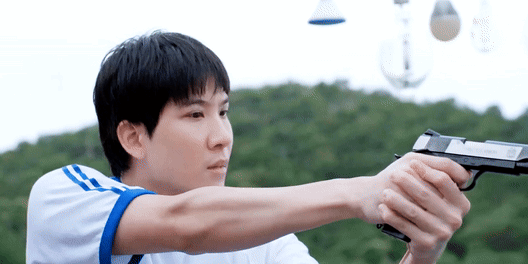
Forcing Kant to jump could also be a test for remorse. 'If I tell you to jump, will you do it or will you fight back or even beg for mercy?' If Bison wanted Kant dead, he could have done it already. We see him consider all the brutal ways he could do so. And yet the one he chooses is actually the least hands on. Watching Kant enact his own demise seems to be a testament to something Bison wants an answer to: a confession perhaps. 'Are you sorry for what you did? Do you regret it? Do you feel bad for me? Was it worth it?' and most importantly 'Do you love me? Did you ever love me?' When someone hurts us, we often want them to admit to their wrongdoing. To take responsibility for the damage they've caused as it gives validation to our pain.
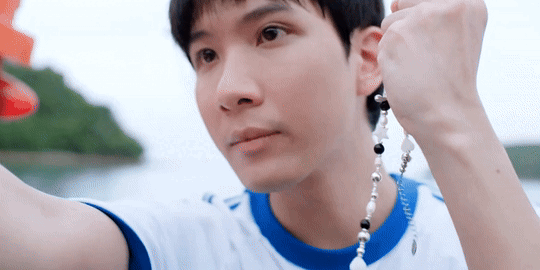

Kant is debilitated by fear, but he's also resigned to his guilt. It's been chasing him this entire time. So he doesn't deny or rebuff what Bison's saying. Doesn't try to deflect or swerve like he's done before now. Neither does he put up a fight for his life. He displays a bedded in helplessness, an acceptance that something you saw coming has finally caught up to you.
When Kant does jump, it seems to take Bison a second to register what's happened. The fact that Kant doesn't come back up. The realisation that Kant may actually drown and die. And he panics.
KANT LAID BARE
(This is my cue to gush about First's acting). I loved his choice of line delivery in this scene. How quietly he speaks. How small, tired, broken and subdued this makes Kant appear. It's such an unexpected but phenomenal choice. It provides a complete 180 to Kant's usual brand of flirty showmanship. That's isn't to say that version of Kant is entirely false but he's definitely been playing up the 'perfect boyfriend' bit. To be as smooth and charming as possible, and to say all the right things to win Bison's heart. This is the first time Bison is seeing Kant stripped of all that bravado. And what's left underneath? Just a man whose desperately afraid.
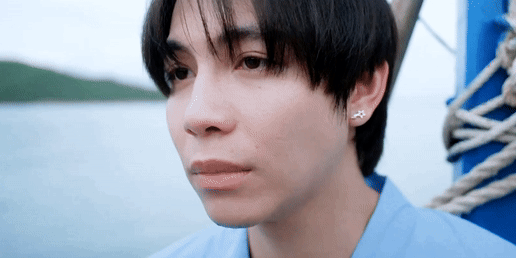
The sheer terror that First portrays here is so layered and visceral. He doesn't just capture that primal fear of death, but there's so much more you can read into outside of the little he does say. Underlying all that physical and mental torment is trauma, a childlike desperation that renders him completely at a loss.
He didn't have a choice when Chris threatened him to become a pawn. He didn't have a choice when it came to choosing between his brother or Bison. He didn't have a choice to walk away. And now he doesn't have a choice in how Bison wants his revenge. I've talked about the loss of control and agency with these two characters quite a bit, but this is the epitome of having your autonomy entirely stripped from you. Kant is both paralysed by his fear of drowning, but also by his guilt and knowing that he brought this on himself - having sealed his fate when he agreed to the job in the first place.
"I promise when you wake up, the version of me you'll see is the real me." What happens when you strip a person of all their defences? You get down to their rawest form. And now we're seeing it.

Thank god the pair reconcile next week, because this was absolutely agonising to sit through. Firstkhao have done it again, but did we really expect any less?
You can keep tabs on bird-inacage’s BL meta directory for my other long-form posts around The Heart Killers, which I’ll be updating in real time as the show airs.
#the heart killers#the heart killers the series#THK#THK meta#kantbison#firstkhao#first kanaphan#khaotung thanawat#FIRST YOU FUCKING GENIUS#my poor darlings#😭😭😭#bison you better be jumping right in to save your man#spoiler: (he does)#ha-di-ha-ha it's a romcom they said#LIES#it's FK we were never going to get through this pain free#i can't wait for their clingy boyfriend era
149 notes
·
View notes
Text

Day fifteen - Chloe group part 1/2

@belsasim, @igglemouse, @invisiblequeen, @paracosmic-sims, @perolesims, @simscici

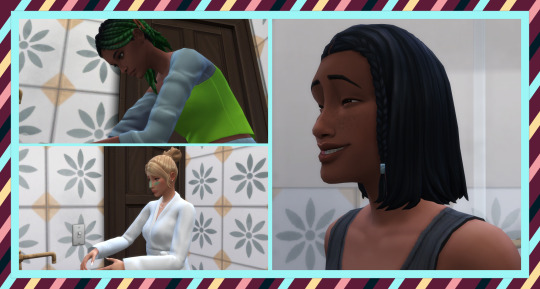
A new day in the villa! Coins are flipped for if contestants will brush their teeth and a wheel is spun for type of shower.

For breakfast contestants were instructed to grab a plate of food then left to make their own choices while Autonomy was set to full. Room doors were locked in the morning to deter computer use. Deanna complimented the outfit of each contestant in order of when they arrived to eat.
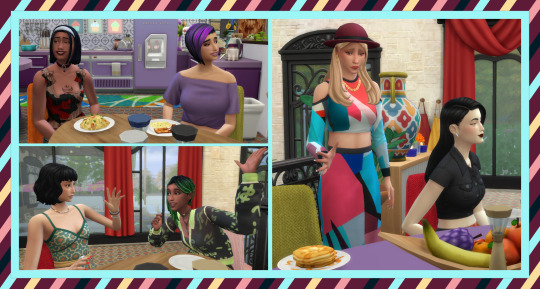
Lara and Hana were the first ones down but it was Callie and Elise that chose to sit by Deanna. It was leftovers for breakfast. Since group meals make eight servings, and each contestant group plus Deanna only makes seven... Apolline was a little late to breakfast, it would appear the increasing grimy state of the villa was getting to her and she was very uncomfortable.
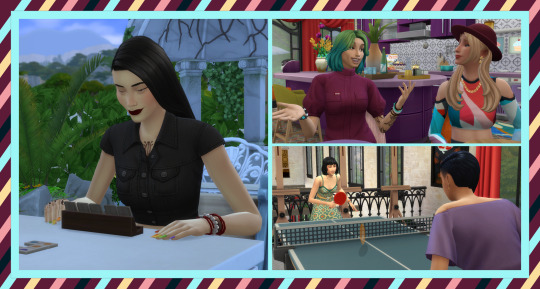
Food and friends make things better though and Billie was quick to cheer her up along with Lara. Hana took some time outside playing simbles solo to try focus her mind for whatever the challenge would be. Meanwhile Callie and Deanna disappeared upstairs to play some table tennis.
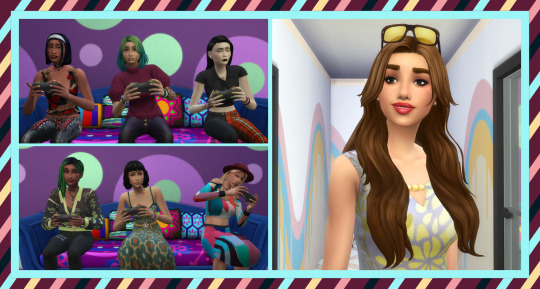
Devin: Welcome to your second challenge. This one was chosen by Joey, little brother to me, older brother to Deanna. Joey wants to get in to designing and releasing his own games, his debut game has been very successful, so you could say he's a tech head. You will be split in to two groups and play party frenzy. Joey, Deanna and I will watch. The person who wins the most games in each team will get a solo date this afternoon. If there is a tie Joey will assess who in the team has the best video gaming skills
Teams were randomised and are Team 1: Elise, Billie, Hana Team 2: Lara, Callie, Apolline
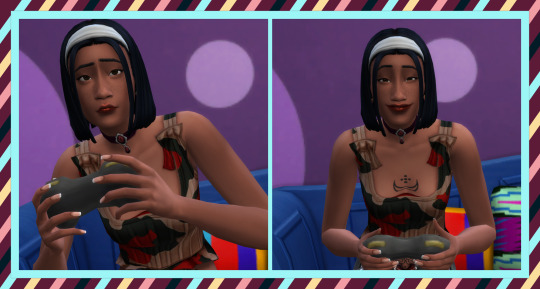
Elise (voiceover): Oh that sounds interesting! Let's hope my fingers are as nimble as usual ~
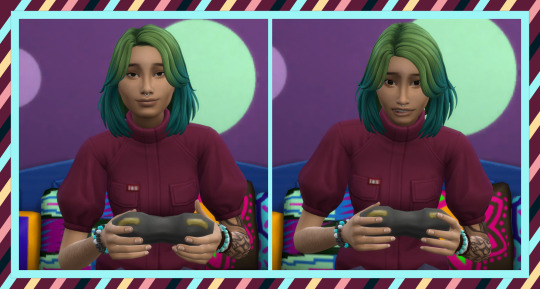
Billie (voiceover): Let's go find people who like to talk about art! That is how you play party frenzy right?
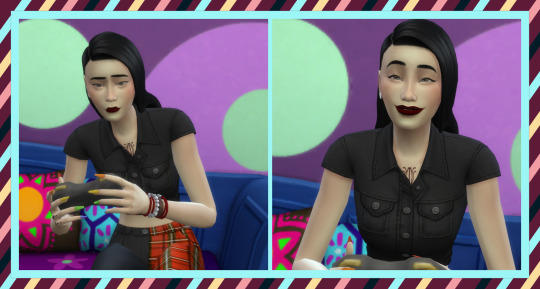
Hana (voiceover): No comment *is noticeably anxious*
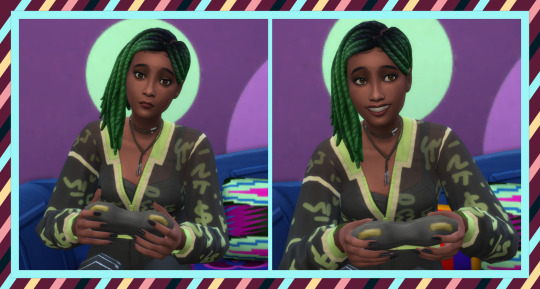
Lara (voiceover): I'm very happy about this challenge!
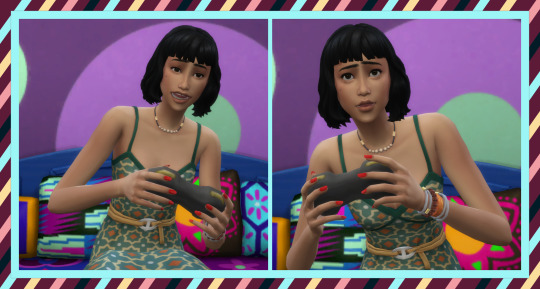
Callie (voiceover): Party and Frenzy? Each word alone terrifies me, but together?
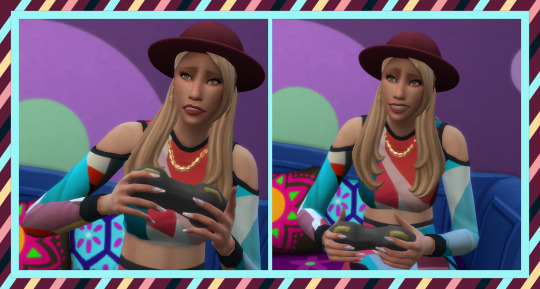
Apolline (voiceover): Videogames… Oh how I wish I were Guilles. My brother would have this in the bag. I suppose I'll have to settle for cunning rather than skills *Rolling eyes*
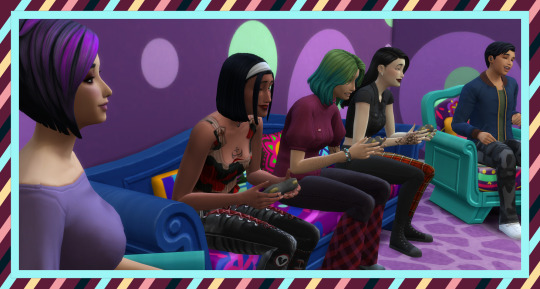
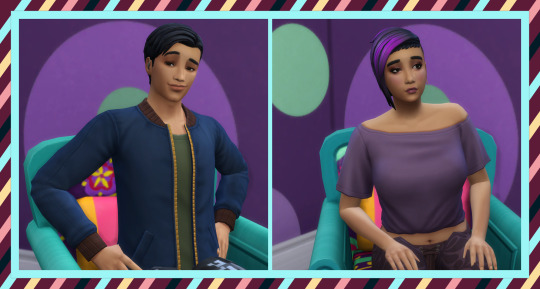
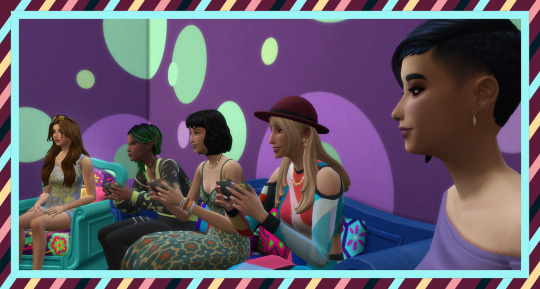
Growing up the York siblings often played video games, challenging each other to contests for fun. Joey felt like whoever wanted to woo his sister needed to have some understanding of how virtual games work so this was his first challenge choice.
In team 1 Elise and Hana tied for first so Joey reviewed and found that Hana had the higher skill level, but only just. Team 2 dragged on... and on... and on... and went an hour overtime playing until Joey called it. We have a schedule to keep! Anyway by a tiny margin Apolline had the higher video gaming skill.
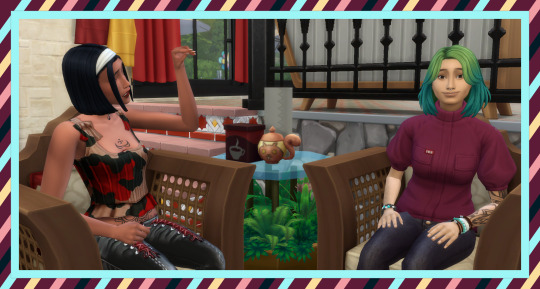
Elise: Awww, bummer. I hope Deanna doesn't have too much fun without me!
Billie: Will there be a painting challenge soon?
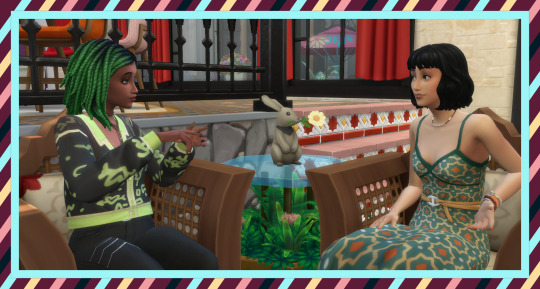
Lara: I am a bit disappointed. This is two challenges now that I didn't get. Still, there's more for this round that I can hopefully win at
Callie: At least I survived!


43 notes
·
View notes
Text
Blatantly Partisan Party Review XVI (WA 2025): Western Australia Party
Prior reviews: federal 2019, federal 2022, plus my friend’s b_auspol review for WA 2021
What I said before: “The Western Australia Party does not openly promote secession or greater autonomy, but their express purpose is to promote the interests of WA … It is possible to advocate for a state’s interests from a left-wing angle, but this is not that party.” (federal 2022)
What I think this year: This party is presently unregistered but at least one independent candidate is affiliated with them. Besides my innate completism to review all parties backing candidates whether they are registered or not, the Western Australia Party has a colourful story to tell.
At state level, the Western Australia Party had their registration cancelled on 20 February 2023 after failing to apply for continued registration. They were also registered federally, and this too was cancelled on 2 August 2023. On 22 January 2025, Anthony Fels—about whom I will say more below—applied to re-register the party with the WA Electoral Commission. This registration is under the full party name Western Australia Party, but the abbreviation for use on ballot papers would be WA First.
Unfortunately for Fels and whoever his current political mates are, this application came in much too late for the party to be registered for the election. You simply cannot get a party registered in a week or two. Among various legal requirements and administrative processes, party applications must be open to objection from the public, and the period to submit objections closed… yesterday, 28 February. The election is in literally a week. Even if the Western Australia Party does successfully obtain registration, it won’t be until later in the year.
So, Fels is running as an independent in the electoral district of Churchlands, which is in the affluent western coastal suburbs of Perth. This is a traditionally Liberal seat—although for most of its history it has been held by a conservative independent, Liz Constable—and it was one of the most astonishing Labor gains in the 2021 landslide. Christine Tonkin, who has confirmed that she is not related to former WA Labor premier John Tonkin (or, at least, that her branch of the Tonkins is a separate branch to his), is very unlikely to retain the seat, which she holds on a margin of 1.6%. She faces an especially strong Liberal challenger in the form of Lord Mayor of Perth Basil Zempilas. He is a popular figure in Perth, at least among a certain type of person, which might come as a surprise to some of you over east who will know him as a sweaty potato who crops up as a C-grade caller on Channel 7's coverage of the AFL, somehow even more mediocre than the likes of Brian Taylor.
But I digress. Fels is making a doomed candidature for his unregistered party alongside Tonkin and Zempilas in Churchlands, and I am unclear if there are any other independents aligned with the Western Australia Party standing for any other seats. Their website and socials have not been updated for over a year. The most recent content on the party website is an “it’s OK to say no” blurb from the 2023 Indigenous Voice referendum featuring Noongar woman Janetia Knapp, who has right-wing ties and stood for the party at the 2023 Rockingham by-election—but is not standing this year. It appears the party is becoming a vehicle for Fels: Julie Matheson, the party founder, is now standing for Sustainable Australia, whose press release announcing her candidature has a note that “The Western Australia Party is under new management and was unable to achieve registration to contest the 2025 WA Election with candidates nominated under its name.” Fels, evidently, is the “new management”.
So, who is Fels? He is one of the most prolific serial candidates and party hoppers in the country, who has stood for more parties than there are days of the week. He won election to the WA Legislative Council in 2005 as a Liberal member for the Agricultural Region, having previously stood or sought preselection for the Liberals since 1989. During his tenure, however, he fell out with the rest of the party, quit, tried and failed to form a party called People Against Daylight Saving, and served out his term representing Family First. After a couple of independent candidatures, he stood for Katter’s Australia Party in 2013 as one of their WA candidates for the Senate; you might recall that the WA Senate count was voided and the election re-run in 2014, by which time he was in the Mutual Party, formerly the Bank Reform Party (whom I reviewed without enthusiasm in 2013).
Fels then became a One Nation member, and although there were some reports he might be preselected to stand for them, he never did. In 2017, he made a foray east for the Bennelong by-election, standing for the Non-Custodial Parents Party (or as I dubbed them, the Disgruntled Deadbeat Dads Party). Come the 2019 federal election, he was a United Australia Party member and stood for them in the sprawling rural WA electorate of O’Connor. He then ran as an independent in the 2021 state election for the upper house region of Mining and Pastoral before contesting the 2022 North West Central by-election for the Western Australia Party. And that brings us to the present!
What does the Western Australia Party stand for? We can’t know exactly, given the dated nature of their online material, but Fels has circulated through parties further right than the Liberals for a while now so that should give a clear indication of his personal politics. The proposed abbreviation of “WA First” suggests Fels might intend to ride the current wave of exclusionary me-first nativism sweeping the globe, and the party’s support for the No vote is another mark against them. Let’s hope the registration is unsuccessful and that Fels in Churchlands continues his recent track record of garnering few votes. Although his name might be well known to election nerds—up there with Vern Hughes and Peter Breen for party-hopping—this recognition thankfully does not carry over to the general population.
(I have my suspicions that Mic Fels, preselected as the Liberal candidate for the Division of Swan in the soon-to-be-called federal election, is related to Anthony but I have found no confirmation. They both have backgrounds in the Esperance region. One would hope that if Mic got elected, he does not repeat his possible relative’s track record.)
Recommendation: If you are a voter in Churchlands, you need to number all squares, and Anthony Fels belongs at or near the bottom of your preferences.
Website: https://westernaustraliaparty.org.au/
#auspol#ausvotes#WAvotes#WApol#WA election#WA#Election 2025#Western Australia Party#WA Party#Anthony Fels#serial candidates#perennial candidates#update your website or gtfo#weak or no preference
6 notes
·
View notes
Note
The Sci fi fic is so fun. I love a good space opera/adventures on an alien world story. Oh man I do enjoy the way Sukuna and Yuuji were both dehumanized by the scientists it's pretty clear that they didn't value the lives of the vessels at all. All of Yuuji's humanity coming from little stolen moments with the other experiment children because the scientists around them didn't see them as people ahh. They picked their own names I'm gonna cry. It seems like his fellow experiments were his only human connections until Yuuji was let out of the facility to work with soldiers. Sukuna though he was the only intelligent curse so he was alone on that front and he probably wasn't allowed to bond and train with others. His psychic bond with Yuuji might be the only real connection he has with another person and that very bond was made to bind him as a prisoner damn. love exploring just how messed up the child soldiers are. They made you to save(serve) them but you're not a person to them. Ahh in the latest chapter seeing how Yuuji just wants his freedom, just wants to go explore the universe and be known for the things he discovers and learns about instead of living his life as a weapon was so good. I want that for him so bad but his life has no value to the people in charge. If the attack dog won't bite put it down. They'd never let him go. I wonder how the public would feel if they saw someone who was portrayed in the propaganda as a perfect happy little fighter wanted to live his own life outside of the battlefield. Perhaps they would start to question the propaganda, perhaps the higher ups would know that. The boy must appear to be enthusiastic about his role or else. He's only marginally better off than Sukuna because at least the regular soldiers he works with now view him as human. They both live with no real rights or freedoms of their own though. The fact that being a vessel forces Yuuji into a role where he has to act as owner and master to another person despite knowing how awful it is to be owned himself is so cruel. I'm glad he respects Sukuna's autonomy as much as he can. He respects the name Sukuna chose for himself and only gives him orders when necessary. He still has some learning to do because Sukuna clearly is a bit more of a person than Yuuji is currently giving him credit for but to be fair to Yuuji Sukuna acts like someone who was raised alone in a box… … … He's got a lot to learn about interacting with and connecting to other people. He's figuring out social skills the hard way ok of course he comes off as an even bigger ass than he actually is. He's smart though he pays more attention than you might think and he's trying to figure this shit out I'm proud of him. I love speculative biology and alien life. If only Yuuji and Sukuna were in a different genre they could be having so much fun learning about the local life. Like Pokemon in space, just let Yuuji tame a bunch of wild aliens while Sukuna goes wild hunting the rest. I was so entertained by Sukuna hunting the local wildlife. He acts like a high prey drive cat. It's great. Yuuji please keep an eye on your curse he is decimating local wildlife populations. We could even make it more fun by throwing in Uraume to have their own cooking adventures learning how to prepare all the insane new foods they find. See reading about the fun little aliens makes me want to go on a hike or something I wanna explore alien worlds too Yuuji. I'm glad the pair are starting to talk with each other and learning about each other's beliefs and feelings. Now all we need is for them to begin to see each other as allies and work together to find happiness in a hostile universe. They can figure it out I believe in them. I had just started writing this comment when you came out with a new chapter haha how do you work so fast I'm so impressed. Thank you for writing and sharing with us!!
It has been fun to write them both trying to figure things out and having such wildly different opinions on how things should play out! Yuuji is trying to work his way through conflicting things, it has been very fun to explore that <3
I'm glad you are enjoying the fic and I'm in the same boat of loving alien biology and wish they had more time to go explore all that without all the stress, just the two of them exploring together like a pair of dorks ; w ;
4 notes
·
View notes
Text
The train making passengers wear uniforms and those boots, that the steward can activate to clamp their feet to the ground and restrain them at will, is really underrated as part of the horror and cruelty of the train. Honestly, the outfits are as bad as the Docent in terms of making book four feel like an escalation + making One feel more villainous.
First of all, I would prefer not to discuss this point in detail, so I’m just going to say this and leave it at that: passengers waking up in clothes they were not wearing when they passed out has the potential to be frightening and confusing for them, in a way that their number (an obviously supernatural glowing number that could have spontaneously appeared by magic for all they know) wouldn’t necessarily be.
Second of all, people having the right to decide what to look like and wear, and what to do with their own body, and using that as part of deciding how to present themself and how they want to be seen, is an important moral value. (Obviously there are caveats here. I’m talking about normal self expression, especially stuff like marginalized gender presentation or religious garb, not like, shirts with hate slogans or refusing to wear masks.) And I do think the show is written from a value system that supports that claim and takes it seriously within the narrative, because that element of bodily autonomy is a huge element of Lake and Grace and Hazel’s character arcs. It is so important to books two and three. The numbers already detract from that in a very nasty and judgmental way, but taking away passengers’ clothes and possessions is nasty and completely unnecessary for the functioning of the train. I do think for some passengers, starting off from a “blank slate” actually might help them figure out if they do want to look different, but that doesn’t make it okay to force all passengers to start off like that. Especially since some of the stolen stuff might be difficult or impossible to replace on the train (religious garb, a specific look or style of outfit that’s really unique, a comfort item like a favorite jacket that’s helpful because it’s familiar, a hand-me-down with sentimental value, etc).
Lastly, the boots giving One a way to restrain passengers at will, especially since he uses it in everyday situations and not e.g. for last minute self defense, is also a huge bodily autonomy issue. One is so casual and matter-of-fact about basically grabbing at passengers (and denizens) and forcibly holding them still, albeit through impersonal technology and not physical contact. One-One doesn’t seem to have changed much in this regard… he hasn’t re-implemented the boots, but look at how he uses the steward to pick up Lake and drag Jesse around in book two. But at least that was much more limited - he had to physically go up to them with what seems to be his only steward. One had multiple stewards, and between the boots and the car freezing power, they seem to have been able to restrain everyone in the same car as them at once. I don’t like him having that kind of power and seeming to feel completely entitled to nonchalantly use it for his convenience or to demand attention.
35 notes
·
View notes
Note
Hello and congratulations for your milestone! i'm quite new around here but i'd like to participate in the event, so may i request the poetries between us with albedo, please?
I'm a ISTJ, very laid back and a little shy person, sometimes i can be really clueless but other times i can also be really perceptive. I tend to be quiet and choose to listen or observe instead, but i would be more talkative and playful when i'm in a good mood. I like reading and i'd love to learn a new language, languages is probably a subject i actually like, i do writings too whenever my muse cooperates with me. Lastly, i love cliche romantic things because i'm a hopeless romantic at heart (ෆ˙ᵕ˙ෆ)♡
Thank you for doing this and i hope you're taking rests and drinking enough water, seeing the amount of requests you've posted for this event <3
you remind him of himself although maybe, just a little bit more humane and a little softer too and more... albedo shakes the thought away in favor of going back to the book you let him borrow. in theory, a relationship with someone who's similar to you should be easier to navigate in but it appears that it was not the case. having affections for you and coming to self-realization were the easy parts. the hard part was the frustration that came in not knowing something that he should know as your lover. it's a strange predicament to find himself in and no matter how you try to console him, he simply says that he should be doing better because you're already doing a little too well.
you give him a margin for error and explain what is natural to most — but not to him — in a way that is simplified and rationalized for his ease. you give him room to breathe even when he, himself, doesn't realize his state of suffocation. you're accommodating and sometimes, he feels as if he doesn't give enough in return. that, to him, is a crime on its own. proportionality is stability and in alchemy, a lack of stability is dangerous. he could only assume that the same goes for love. sometimes, you hoped he would just listen because albedo returns just as much as you give him even when he doesn't realize it. he answers your questions no matter how irrelevant and even designs experiments to test out a wild hypothesis that came from your happier moments. he trusts in your capabilities and respects your autonomy but that doesn't mean he's disinterested — in fact, it's the opposite. he designates time to study a new language with you and often converses with you to mimic the idea of being alone in the world together, or at least, that's how it appears in your lovesick daze. loving him is a stray flower growing in the gaps between cobblestones, it's a firefly in a bottle presented as a gift before you ultimately release it together, and finally, it's his little smile as he holds the door open for you. it's adorable and romantic and innocent and genuine and a little clumsy but that's enough, isn't it?

━━ ☆ NOTES: hellooo! thank you for joining the event! meeting new people is always fun and what better way to do that but in the middle of festivity? i hope you liked it because it's the only way i could think of to return your kindness and concern. i'm doing well so i hope you are too!
━━ ☆ WANT TO JOIN?: send me an ask here!
6 notes
·
View notes
Text
Eurasia’s Great Game: India, Japan and Europe play to Putin’s needs

By James M. Dorsey
A podcast version of this story is available on Soundcloud, Itunes, Spotify, Stitcher, TuneIn, Spreaker, Pocket Casts, Tumblr, Patreon, Podbean and Castbox.
Eurasia’s Great Game is anything but simple and straightforward.
A burgeoning alliance between China and Russia that at least for now is relegating potential differences between the two powers to the sidelines has sparked a complex geopolitical dance of its own.
With India, Japan and Europe seeking to drive a wedge between the two Asian powers, Central Asian states, where anti-Chinese sentiment is rising, are quietly rooting that Asian rivalries will grant them greater manoeuvrability.
Indian prime minister Narendra Modi on a visit to Russia this month during which he attended the annual Eastern Economic Forum in Vladivostok, established to attract Asian investment in the country’s Far East, announced a US$1 billion credit line to fund development of the region.
Mr. Modi and Russian president Vladimir Putin also agreed to establish a maritime link between the Far East’s capital, Vladivostok, and Chennai that would reduce transport time from 40 to 24 days.
The connection potentially could serve as an extension of the Indian Ocean Corridor that links India to Japan and the Pacific and competes with China’s pearl of strings, a series of ports across Asia in which China has invested heavily.
In contrast to Mr. Modi, Japanese prime minister Shinzo Abe, who has attended the forum since its inception in 2015, did not announce any major deals in response to Mr. Putin’s insistence that “the development of the Russian Far East, strengthening its economic and innovation potential, and raising the living standards of its residents among others, is our key priority and fundamental national goal."
With the trans-Atlantic alliance fraying at the edges, Markus Ederer, the European Union’s ambassador to Russia and one of the EU’s top diplomats, appeared to recognize Mr. Putin’s priorities when he urged the bloc, to engage on a massive scale with Russia on some of the most tricky political and security aspects in their relationship despite differences over Russian aggression in Ukraine and Georgia, human rights and alleged Russian interference in various European elections.
In a memorandum to senior bureaucrats, Mr. Ederer suggested that 5G mobile communications, personal data protection, the Artic, regional infrastructure and the development of joint policies on matters such as customs and standards by the EU, Russia, Norway and Iceland, should be topics on the EU-Russian agenda.
Mr. Ederer said that these were areas “where leaving a clear field to our competitors by not engaging would be most detrimental to EU interests.”
He argued that a “pragmatic” move towards “enhanced co-ordination” with Russia was needed to combat “Eurasian competition” as China’s influence grows.
The EU “would have everything to lose by ignoring the tectonic strategic shifts in Eurasia. Engaging not only with China but (also) with Russia…is a necessary condition to be part of the game and play our cards where we have comparative advantage,” Mr. Ederer asserted.
Messrs. Modi, Abe and Ederer see opportunity in what Thomas Graham, a former U.S. diplomat and managing director of Kissinger Associates, describes as Russia’s need for “diversity of strategic partners in the (Far East) to maintain its strategic autonomy (from China) going forward.”
The EU, India and Japan hope to capitalize not only on Russia’s requirement for diversified investment but also Mr. Putin’s need to counter widespread anti-Chinese sentiment in the Far East that has turned against his government at a time that protest in Russia is accelerating and after Mr. Putin’s party this month lost a third of its seats in the Moscow district council.
Public sentiment east of the Urals is critical of perceived Chinese encroachment on the region’s natural resources including water, particularly in the Trans-Baikal region.
A petition initiated earlier this year by prominent Russian show business personalities opposing Chinese plans to build a water bottling plant on the shores of Lake Baikal attracted more than 800,000 signatures, signalling the depth of popular resentment and pitfalls of the Russian alliance with China.
Protests further erupted earlier this year in multiple Russian cities against Chinese logging in the Far East that residents and environmentalists charge has spoilt Russian watersheds and is destroying the habitats of the endangered Siberian tiger and Amur leopard.
The protesters, who also denounced construction of housing for Chinese workers, are demanding a ban on Russian timber exports to China.
Underlying the anti-Chinese protests is the lopsided nature of economic relations that Russia scholar Leo Aaron says fits Karl Marx and Vladimir Lenin’s definition of colonial trade, in which one country becomes a raw material appendage of another.
“China is Russia’s second-largest trading partner (after the EU) and Russia’s largest individual partner in both exports and imports. For China, the Russian market is at best second-rate. Russia ranks tenth in Chinese exports and does not make it into the top ten in either imports or total trade,” Mr. Aaron said.
He noted that three-quarters of Russia’s exports to China were raw materials and resources as opposed to consumer goods, electronics and machinery that account for the bulk of Chinese sales to Russia.
European, Indian and Japanese efforts to capitalize on anti-Chinese sentiment taps into a deeply embedded vein.
Writing under the pen name P. Ukhtubuzhsky, Russian author Nikolai Dmitrievich Obleukhov warned already in 1911 that “Russians are being displaced by the yellow races who seize commerce, industry, wages, and so on… God guides people. Those nations who protect Good and Truth will be victorious. If Russia, carrying the light of Orthodoxy, faces in Asia the yellow races wallowing in the darkness of paganism, there cannot be any doubt as to the outcome of this struggle.”
Mr. Putin, presiding over a country in economic trouble, can’t create the margins of manoeuvrability that he needs on his own. He hopes that India, Japan and Europe will come to his aid.
Dr. James M. Dorsey is a senior fellow at Nanyang Technological University’s S. Rajaratnam School of International Studies, an adjunct senior research fellow at the National University of Singapore’s Middle East Institute and co-director of the University of Wuerzburg’s Institute of Fan Culture
#Russia#China (PRC)#china#Vladimir Putin#putin#india#modi#ASIA#Eurasia#Central Asia#indian ocean#Japan#europe#EU
2 notes
·
View notes
Text
While I definitely support autonomy and the power of decision in the hands of the consumer, it is important to note that stock Android devices are still subject to a stranglehold by Google using default modes of operation. Apple is by far the worst offender, but the switch to an Android-based device is now only marginally better. The key difference is that, in addition to maintaining the “walled garden” for software applications, Apple locks consumers out of the hardware itself, preventing a non-iOS operating system from being loaded. They have you at the software level, the OS level and at the hardware level. Google has been migrating in this same direction as well, albeit at a pace most barely notice.
Android devices at least allow for installation of a third-party OS (now with substantial extra difficulty), but over time the ability of the stock software and other applications to control hardware function has increased. Even if you think certain hardware functions are not active (microphone, camera, wireless & location services), chances are that there are now some background applications which are keeping them all on all the time, no matter how you have them configured. Google also has moved closer to the walled garden approach to applications, relying on the insidious appeal of ease in its native bundled applications to keep users from trying third-party alternatives. Google’s business model demands that they have constant access to every kind of personally identifiable information possible as often as possible in order to serve advertising.
At present, the only truly free solution is to invest the time, energy and money into a switch to a Librem phone from Purism (on the web at https://puri.sm/ ). Hopefully more solutions will appear in the future, but for now, this social-purpose corporation has as its sole objective the complete and total return of autonomy, freedom and privacy to the end-user. The devices produced by Purism run the completely free and open source (FOSS) PureOS operating system, which runs on desktops and laptops too, and is completely free from any dependence upon Google, Apple, or any other tech supergiant. Librem phones and laptops include /hardware/ kill switches for camera, microphone and wireless connectivity, including mobile data. This means that you can flick a physical switch to disconnect them if you want to be sure that they are actually off.
Additionally -- get this -- YOU CAN REMOVE AND REPLACE THE BATTERY YOURSELF IF NEEDED. This means you can keep your phone for more than 2 years if you want to, especially if you simply cannot afford an entire phone replacement. Best of all, the chain of custody for the software AND the hardware is auditable, and it is actually possible to get a phone which was made in the United States if you are uncomfortable with overseas manufacturing (if you are not in the U.S., I would still recommend getting a U.S. Librem device, if export to your country is not restricted).
Do the research yourself. Do not take my word for it. I am not a spokesperson for Purism or any of its affiliates and I am not compensated in any way for preaching the Purism philosophy. This is just one of a small handful of companies which have been built from the ground up by people who want a better future than what we are currently facing.
So, in short -- definitely switch to Android to start. Try de-googling your Android device. Migrate your email to ProtonMail or Tutanota instead and then ditch all of the Google-based services in your life, INCLUDING CHROME (try Firefox and/or Vivaldi). It might be pretty hard these days to go through and manually turn off, disable or uninstall all of the Google background services and spy settings, but it will be well worth the time and the extra battery life. Once you have had a go at that, then save up and make the leap to a Librem phone too. We as consumers have the ultimate say in who holds the keys to our technological independence, so we have to collectively speak up through our own habits in order for the change to happen.
This is a good time to remind everyone to swap from Apple to Android the next time they have the means and need to get a new phone
Android phones are almost universally...
Cheaper
More durable
More customizable
Faster & more reliable
Less likely to remove perfectly workable features just because they are "old"
Better for pirating media
Y'all have got to stop enabling Apple's insistence on being a fashion brand rather than providing electronics that respect your autonomy and decision making powers.
Next time you have a choice in the matter, go Android. One minute of being able to actually browse your file architecture without jumping through proprietary bullshit and you'll be hooked, I promise.
48K notes
·
View notes
Text
Navigating Trauma In The Mardock Scramble
Mardock Scramble is an exploration and condemnation of the criminal justice system and social structures that perpetuate injustice and the violation of the victims it is supposed to protect.
Trigger warning: this content is graphic in it's depicts of heavy subject matter. Sexual assault, incest, prostitution of minors, and rape among them.
At a young age of 15, Rune Balot is a sexual assault survivor turned prostitute, who is then jailed. When Shell, an entertainment star turned casino owner offers to elevate her life to something she never dreamed she could have, so long as she follows his rules, she enters a lavish life that she ends up regretting, effectively trading one form of imprisonment for another.
We first see Rune in a limousine, careening through a futuristic city of roads that appear to be light bridges, projected ads on skyscrapers dot the surroundings. Dr. Easter, following the limousine, ostensibly to save a girl from the clutches of serial killer revealed to be Shell. The victim revealed to be Rune.
"We performed Q and A with your subconscious... though comatose, It was all perfectly legal I assure you. Do you want to live, do you want to exercise your rights, etc. When the question was posed your subconscious chose 09; Mardock Scramble 09. That's an emergency ordinance for the preservation of life using otherwise prohibited technology."
Shell tells Rune she hasn't followed the rules and will become another one of his blue diamonds, locking her in the limousine and blowing it up—killing her. Dr. Easter pulls her from the wreckage and, through advanced technology interfaces with her subconscious as she's comatose, asking if she wants to be saved using a precedent in the city in which experimental technology can be utilized, Mardock 09. Thus, she awakens to a new, synthetically crafted body with numerous enhancements, including armored skin and the ability to manipulate technology using something called Snark.
Dr. Easter devised this tech during a war. If he doesn't prove himself as a 09 caseworker, helping victims of crimes be heard and to get justice, he will be charged with crimes of human experimentation and jailed.
Shell, beyond being a serial killer, launders the money of a megacorporation through his casino that has a special exception from the government to use banned technology for "amusements and pleasure". If Rune gives her consent to allow the Doctor to be her caseworker he promises to keep her safe, convict Shell for her crimes, and garner a sizeable award for solving the case, to be shared 50/50. Rune could use to start a whole new life.
Along with this deal, Oeufcoque, a sentient, shape-changing... entity? Developed for space travel by Dr. Easter, would be paired with Rune as a protector. Oeufcoque is referred to as something called a "universal item": something that can take any shape. But who’s natural…configuration is in the form of a yellow mouse which has powerful olfactory senses, allowing him to be able to sense the emotions of others through smell. When held by Rune, Oeufcoque turns into "her heart’s desire". Most of the time he takes the form of a weapon, as Rune wants and craves protection and revenge. A theme explored throughout all three, one-hour long movies.
Oeufcoque believes that since they saved Rune, they have a responsibility to her. To help her find meaning in a new life, and to help her discover her purpose. This becomes Oeufcoque's purpose and the main vector for the exploration of Rune's past and struggles as she attempts to find a place in the world with a true ally, even as she also wrestles to shape what form and meaning her revenge on Shell would look like and feel like to her. Is it enough to have him locked up? Or will she use her new cybernetic body to exact pain and vengeance, perhaps becoming a criminal in the eyes of the law herself?
What makes this more complex is that Rune's voice could not be replicated. Instead, she utilizes technology around her to vocalize herself. Thus, her ability to speak to Oeufcoque directly using her Snark is the first time she's able to freely express her thoughts and opinions; free of the rules placed on her by society and Shell.
Rune is also given "the ability to resist"; self-defense techniques, the ability to use a gun. In fact, Dr. Easter insists that her subconscious made the decision. Taking the means of her resistance even if her waking mind is still coming to grips with her new life.
Shell had surgery as a child, indicated by a cybernetic implant on his head. When he feels "stressed" his implant instead floods him with euphoria that was supposed to prevent crime in the past, when this was all experimental. With a side effect of extensive memory loss, which… he then also modifies with designer drugs, he’s able to get rid of the “stress”, experience euphoria, and never remember his crimes.
"…to overcome this little ritual of mine. These beautiful blue diamonds let me climb the stairs of the greatness of the city; to rise above it all."
He represents privilege. His memories are extracted, recorded, and erased by doctors. His brain "would rot" if he didn't. He furthers his plan to claw more and more power and to kill at a whim doing as he pleases with this regime and considers all it, “just a dream”. A fog he can't access but is aware of. Allowing this other “version” of himself free reign.
"To me, it's all stuff that happened within a dream. Besides, new memories mean that everything is in place to make my deal...To humans memories are a precious, irreplaceable thing; I don't mind having mine emptied. I'll be filled later. A vessel meant to be filled with glory. That's me.”
Oeufcoque, it turns out, has also been abused. It's possible for his user to force their will on him, changing him into a weapon used to kill innocents instead of merely to protect themselves like his purpose. When a human does this it physically hurts Oeufcoque; it could even kill him. Shell has hired his abuser, Boiled, sending him after Rune when he learns she's alive and could provide testimony against him. This becomes a vector for exploring technology as a tool, whether it possesses sentience or not. Oeufcoque serves as something tangible that bleeds and hurts, an allegory for the pain others feel in the blind pursuit of vengeance and even cruelty for Rune and the audience.
The three movies follow the duo as they confront their trauma together, figure out what it means to support one another, and protect each other fiercely. Oeufcoque provides information while generally attempting to be non-judgmental giving Rune the information she needs to make her own decisions; all while she does not have a voice of her own. She “forgets what her voice even sounds like”, something she will have to rediscover throughout.
This is where Mardock Scramble really sings, in my opinion. This dynamic is used as an intersectional lens to explore hard subject matter that cyberpunk generally tends to avoid while claiming to be exploring the margins and disenfranchised. Rune's past and how she deals with her new-found autonomy in a foreign body is compelling and done well, as far as I can tell. All of the characters are more complex than is typical and provide a lens for looking at where society is failing.
Where things get significantly murky is regarding the team of mercenaries dispatched to kill Rune in the first movie. All obsessed with a different body part. Transplanting their victims onto their own bodies; there is horror aspect introduced. One transplants eyes onto his body, someone else transplanting the breasts of victims; another, most disturbingly, is looking for the perfect victim to kill and transplant their sex organ into his hand. Clearly used to show fetishization of the human form, as they seemingly only kill women and appropriate their bodies for their own, it is still jarring and disturbing, even if it's used a vector for Rune's empowerment in the long term. A major theme of the first movie. The subject matter doesn’t shy away from being transgressive and disgusting.
It explores privilege and how power structures in place preserve and amplify it; consent and the damage the patriarchy can have, especially women; prostitution, sex, nudity, incest, the male gaze, fetishization of the female form, and other difficult subject matter is interacted with and given varying degrees of nuance and time. As a man, it's hard for me to judge if it is all done well or is ultimately simply problematic. Based on the dialogue and the premise, it feels like the intention is good and it was certainly unlike anything I'd ever watched, especially in cyberpunk as mentioned previously. It is graphic in it's depiction of these things and does not shy away from the subject matter. It is trying to convey that these things are disturbing as Rune comes to grips with them. But it is, at times, hard to watch; with the later movies significantly toned down and exploring alternate subject matter, for the most part.
The animation is gorgeous, Rune is able to do very cool things; the fights are great. The music as well, is superb. Mardock Scramble, at the very least, has gone under the radar. I hope that despite the difficult and triggering subject matter more people end up being able to experience it and share their thoughts on it so there is a more nuanced take on it than I can provide. It may be problematic in some instances, but it is complex beyond simple shock value, especially in the latter two movies, and tackles themes often skirted.
If you buy the bluray you can also watch either the director's cut version or theatrical, the later of which has toned down all aspects of the sexual scenes, including the assault at the beginning.
8 notes
·
View notes
Text
Democracy
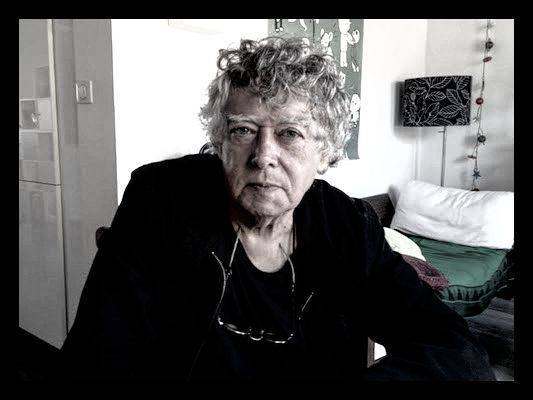
Jean-Marie Gleize
There is, in Rimbaud’s Illuminations, a text called “Democracy.” We know little of this text’s composition, as the manuscript is lost. It was published belatedly in a journal (La Vogue, 1889), but we are scarcely surprised to encounter a text of this title from the quill of that democrat Rimbaud, virulently hostile to Napoléon III’s dictatorship, radically aligned with the insurrectionary movement of the Paris Commune — with, one might say, an insurgent, revolutionary democracy. As Bernard Noël has suggested, Rimbaud is a communard “not only in his opinion, but in his being.” Now the particularity of this poem is in being the only one in the collection entirely within quotation marks. It is democracy who speaks. It concerns prosopopoeia. Upon recognizing this, the Rimbaud specialists are perplexed, their opinions contradictory.
To revisit the formulation of one (Pierre Brunel): “Rimbaud’s intention seems particularly difficult to grasp.” In effect, the text expresses imperialist and capitalist violence, announces the massacre of the “logical revolts” … Does Rimbaud affirm and take up the mantle of a conquering warrior for democracy, a manifestation of the people’s power (according to his native, regular scheme: the necessity for destruction/detonation toward a regeneration or a later reconstruction)? Does he take a malign pleasure in transcribing the caricature of democracy delivered by his bourgeois adversaries, evoking the horror and terror it inspires in them? Here we must return to the quotation marks. If Rimbaud expressed himself in his own name, as he does in all of Illuminations’ other poems, he would do so without divagation. In this poem it must be democracy who speaks, saying that which it is and does, its fearsome civilizing program. The result is finally that the reader is led to transfer the quotation marks to the only word in the text which does not bear them: its title.
“Democracy” is by no means the power of the people but the instrument of the people’s domination and oppression; “democracy” is not democracy. This fact allows us to return to the ambiguity of the writer’s gesture, ambiguity that is at once voluntary (the rhetorical work’s deployment of prosopopoeia as concerted device) and inevitable, already having happened: the Illuminations speak at once the unacceptable character of “the rest of the world,” of the world as it is, its violence and the counterviolence necessarily entrained, the more or less utopic visions that it arouses, etc. If something like democracy exists, it doubtless supposes other struggles, other forms of life of which the labor of poetry can make only confused or oblique reports. Exigency, malaise, anxiety, anger, semantic and rhythmic troubles, critical opacity: such are some of the symptoms of this state of discomfiting resistance where one finds the “horrible workers” to whom Rimbaud is brother.
For those who persist “like” Rimbaud, after the flood, in the hive-chaos of big cities, modern industrial and postindustrial societies, those of the western “democratic” empire, the leading sentiment remains that results from the fact that democracy signifies for the moment capitalism, the regime of liberty and liberalism (work, finance, exploitation, profit) — and this democratic capitalism, the polluted air which we breathe, moreover appears as the ultimate and definitive, and for that matter “natural,” form of social life. There is, there will have been, no alternative. Thus the necessity to qualify, to specify: parliamentary, or rather, today, mediatic-parliamentary, democracy, liberal democracy, but also, because quotation marks are there if we try to retrieve, that is to say reappropriate, the word and the thing, “true democracy,” as Marx said, or “wild democracy,” or “radical democracy,” or “insurgent democracy” (as Miguel Abensour suggested, democracy in a permanent state of emergence and constructive critique), or even “democracy without limits” as proposed by Rosa Luxemburg in opposition to “bourgeois democracy.” She subjected “democracy” under quotation marks to an examination of limits and internal contradictions wherein she observed, as did Rimbaud, two closely linked antidemocratic dimensions: militarism and colonialism, the importance of the military apparatus being linked on the one hand to the containment and repression of popular insurrectionary movements, and on the other hand to imposing on the colonized by force of arms the benefits of western economic exploitation and domination.
Thus there is for those, among whom I am one, who continue to read and write within that which we name poetry (that is to say, who situate themselves marginally within the practice of literature itself grown culturally secondary and minor), essentially the consciousness of not being much in phase with democracy as ambient value, as political ideology and as form of government, the feeling of being in no regard represented by the professional politicians and others who themselves are manipulated and ventriloquized by the holds of real power (that of the globalized economy), and with an insuperable sense of paralysis or choking powerlessness. The words slide around, it is enough just to listen. For example this kid from the Maghreb who participated in the 2005 banlieue riots around Paris: he speaks of his parents and the society which would “incarcerate” them. He means to say “integrate” them. This slip understands that such integration might be felt as a process of confinement and violent maintenance of inferior social status. It’s all too evidently symptomatic when some contrarily affirm (against all visible evidence, in situations of extreme material and mental precarity, in the suffocating context of our quote-unquote “democracy”) the actuality of their emancipation. I want to underscore indelibly this phrase in the contemporary poetry journal Nioques from poet Christophe Tarkos, who died prematurely in 2004: “I am not squeezed, I do not choke myself, I am not shattered, I am not buried, I am not surrounded, I am not crushed, I breathe.” He personally supports this affirmation, based on the denial of crushing in its many forms. And if he can support this position, if he can affirm so strongly the negation of the negation, it is because he writes, and because this practice of poetry he understands and lives as insurgent and emancipatory. This incites us to grasp precisely that what initially renders poetry political for Christophe Tarkos is that it is an act, and that this act of language is (or at least may be) singular affirmation, demand for autonomy, form of life and of survival in hostile surroundings.
We must perhaps return swiftly to some naïve distinctions. There has been in our recent history something like a poetry engagé, that of the Resistance, committed to direct communication (simple forms, combat lyricism) with a people awaiting democracy. Before this, when surrealism had wished to articulate itself seriously in the real movement of history, it declared itself “in the service” of Revolution (without retreat, nonetheless, from the ardent necessity of transgression or formal subversion). After the war we see Paul Eluard publishing a book called Political Poems, with a preface by Aragon. The communist poet does not neglect to underline what “politics” means for Eluard, for himself, for his comrades, and the sense of the slogan “from the horizon of one to the horizon of all” (which could equally be the broad slogan for a “democratic poetry”). He does not omit Isidore Ducasse’s encouraging watchword: “poetry must take for its goal the practical truth,” interpreted as enunciating or announcing the passage of eras (a romantic thought) from utopias to that of “human efficiency.” It is patently obvious that the standard poetic ideology, from historical avant-gardes to the neo-avant-gardes of the sixties and seventies, from lyricism engagé to political poetry or the theorization of the “revolution in poetic language” consonant with the desire for Revolution, is one of “efficiency” (to reclaim Aragon’s word) for poetry, more or less immediate or oblique, more or less direct or restrained.
Yet it is no less clear that around the eighties there was what I shall call a sequence of burgeoning euphoria (combinatorial transgression, subversion, experimentation, invention, action), thanks to varied collapses of that to which it would be anyway pointless to return. The field of contemporary poetry then reconstituted itself (as do families) around two principal poles: that of return (what I call re-poetry) to the fundamentals of a poetry restored to itself, and thus restored to the public, to the common reader, after the disfiguration and aggravation of divorce, and that endeavoring not to break with the heritage of research and adventure, recusing itself from the dogmatic stances and political illusions of the night before and the night before that. We note then the emergence of a generation of poets, published in journals such as Java, or Facial, or Quaderno, or even the Revue de littérature générale of Olivier Cadiot and Pierre Alferi, clearly experimental in orientation but also clearly apolitical, practicing criticism (that of social and/or genre conventions) via modes of ironic distance or parody and derision. Poetry or more broadly forms of critical art in effect posed particularly the question of the cultural hierarchy separating the major from the minor or “popular” modes of expression. An “eccentric essay” (as the author himself defined it) titled “Parodic Art” (published in 1996 under the name Arnaud Labelle-Rojoux) tried to describe and theoretically legitimate some of these practices of a systematic reversal of values (or of confounding registers and genres) that spread in this period of a post-avant-gardism that was a bit skeptical, or at least suspicious regarding the high seriousness of previous generations.
It would likely not be mistaken to say that the poets of preceding generations took somewhat for granted (against divergent strategic choices regarding the logic of their practice, their modes of realization, etc.) an adherence to a principle, explicitly formulated or remaining implicit, something like an ideal of real democracy, while accepting as largely inevitable the fate of renouncing a large audience, and the much-hurled accusation of “elitism.” The poets of the generation whereof I speak, those I have just said have taken their distance (and not ordered their work according to the expectations of some given belief), found themselves to be subjects of a sort for a practical “democracy” in the sense that they actively refused to ignore the current modes of expression and mass culture (media, screens, collections of official statements, assemblage, sampling, various détournements, etc.). The great question is whether the apparent ideological “retreat,” which at first glance characterizes this body of text, indicates a neutral stance, an indifference to concerns of content (even an unspoken adherence to what they do convey), or whether to the contrary these poets subscribe to a perspective comprising a form of active “resistance” to these formats, these contents, these modes of circulation and public display, etc. These “after-writings” — after the dissolution of dogmas, after the last wave of avant-garde theorizing and sectarians, with faces both of the “ironic” and of the “serious” (collage-writing, investigative or documentary writing) — can doubtless be read as critical but no less as preserving for the reader their share of ambiguity and constitutive undecidability.
What can be seen, in these writings “after” (and the occasional taking of certain concrete positions on social struggles or alternative movements), is a definite return of the notion of resistance. As all around us gestures of “civil disobedience” develop (from Athens to Tunis and to Cairo, from New York, Occupy Wall Street, from Tarnac to Notre Dame des Landes …) which are like mass protests in the name of democracy without quotes against the decisions or “laws” or official conditions imposed by the police and the court of “democracy,” that Rimbauldian prosopopoeia within which we are always citizens, we notice, in the regime called the poetic, or post-poetic, the fact that the imaginary of resistance continues to resist. It may be necessary here to revisit Francis Ponge’s propositions announced in a number of his “proems” from the thirties — so near us today where we see democratic elections bringing to power religious fanatics, where left governments are anxious to expel foreigners, what is basically a “democratic” progression toward municipal fascism. Ponge, rather than suggesting to his surrealist friends of the time the pseudo-“liberating” whisper (automatic writing) advocated “resistance against words,” that is to say we ought not speak the ideology that speaks us (doxa, stereotypes, clichés conveyed by the mediasphere) but contrarily to work contra-words, on contra-usage, to practice, if needed, “the art of violating [words] and the submission to them.” Such a poetic remains fresh, in the face ofthe “order of things,” which he qualified as “monstrous” and “sordid,” wherein he said that people kill themselves “having been ruined” by these “governments of wheeler-dealers and merchants,” the very “democratic capitalism” that I mentioned earlier.
Resistance against words, therefore, opposes the silence of writing to the noise of words, or even unmaking and remaking the ceaseless superflux of immaterial information to recover if possible the meanings of the words, the meanings of things and situations and events. But resisting just the same images, the ceaseless flow of images, those which “occupy” our space and our eyes, screen-walls that separate us from each other and from reality. Bearing in mind that these images “constitute part” of this reality from which they also separate us. And therefore it is a matter of working with and on and against these images through superimposition, overprinting, decomposition, etc. Finally, the resistance against images means equally — and I revisit here the “position” of dislocation according to diverse variations and stances of commitment — renouncing the narcotizing magic of nationalist visions, those which nurtured and carried our imaginary political utopia. We renounce this so as to confront clearly our lot: the traversal — using for our writing the contingencies of terrain, of context, of circumstance — of the opaque thicket, that of real contradiction, conflictual and violent. This is one meaning of the phrase borrowed from an artist and installation or intermedia poet (Philippe Castellin): “Poetry isn’t a solution.” If we understand the enduring and insistent and even resistant practice of writing poetry (in the context where it has become a socially minor practice) as a critical and restricted contribution, half-blind, to the permanent invention of a democratic space, we know quite well that there is no solution, and that writing has no purpose but to intensify the questions.
This hypothesis makes sense only if we think of democratic space (the possibility of democracy) as outside of political institutions bearing the name, and if we imagine the concrete reality here and now of autonomous, self-managed “communes” where we can experiment freely with new forms of sensory experience, new forms of exchange, expression, communication, collective activity, life. Such islands of life and action, moreover of reflection and struggle, exist already. Experimental politics, at significant distance from political institutions, are or should be in principle like experimental art and poetry, by definition. It is for us to build our own cabins and the paths which connect them (these may be journals, editorial microstructures, alternative circuits of distribution), and if our cabins are destroyed, we rebuild them elsewhere without becoming discouraged.
And since I began this text with Rimbaud, I end within those quotation marks and logical revolts. The question, poetic and political, is that of words’ meanings. Those given them, or those inflicted. And that which we would like to make. It can arise from this long and “ferocious” sequence (that which develops the Rimbauldian prosopopeia) called by the poet the “logical revolts,” those of the colonized, the exploited, the displaced, the oppressed, then, and now, and everywhere.
Logical, that is to say, inescapable.
Logical as well because that names a return, a reversal, an overcoming, in language, in words, in writing, in traces.
Translated from the French by Joshua Clover
14 notes
·
View notes
Text
India Adopts the Tactic of Authoritarians: Shutting Down the Internet
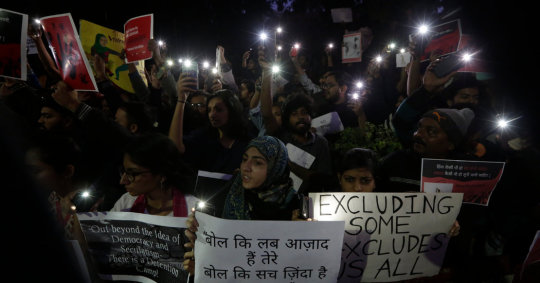
NEW DELHI — As the government of India pushes increasingly provocative policies, it is using a tactic to stifle dissent that is more commonly associated with authoritarian regimes, not democracies: It is shutting down the internet.India tops the world — by far — in the number of internet shutdowns imposed by local, state and national governments. Last year, internet service was cut in India 134 times, and so far this year, 93 shutdowns have occurred, according to SFLC.in, which relies on reports from journalists, advocacy groups and citizens. The country’s closest competitor is Pakistan, which had 12 shutdowns last year. Syria and Turkey — countries not especially known for their democratic spirit — each shut down the internet just once in 2018. “Any time there is a sign of disturbance, that is the first tool in the toolbox,” said Mishi Choudhary, founder of SFLC.in, a legal advocacy group in New Delhi that has tracked India’s internet shutdowns since 2012. “When maintenance of law and order is your priority, you are not thinking about free speech.”Last week, citing a threat of violence and false rumors, authorities in the states of Assam, Meghalaya and Tripura in northeast India severed connectivity in response to protests against a new citizenship law that critics say would marginalize India’s 200 million Muslims. Much of West Bengal and parts of Uttar Pradesh, two of India’s most populous states, were also put under digital lockdown. With the Kashmir region still languishing offline since August, at least 60 million people have been cut off — roughly the population of France.These moves come as Prime Minister Narendra Modi tightens his grip on India. His administration and its allies have jailed hundreds of Kashmiris without charges, intimidated journalists, arrested intellectuals and suppressed gloomy economic reports. His critics say he is undermining India’s deeply rooted traditions of democracy and secularism, and steadily stamping out dissent.With half a billion Indians online, the authorities say they are simply trying to stop the spread of hateful and dangerous misinformation, which can move faster on Facebook, WhatsApp and other services than their ability to control it.“A lot of hate and provocative stuff starts appearing on messaging services, particularly WhatsApp,” said Harmeet Singh, a senior police official in Assam, which borders Bangladesh and has been one of the hot spots of protests against the citizenship law. But as the internet becomes more integral to all aspects of life, the shutdowns affect far more than protesters or those involved in politics. The shutdowns can be devastating to people just trying to make a living. In Kashmir, internet service was stopped on Aug. 5, when Mr. Modi’s government suddenly revoked the area’s autonomy, sent in thousands of troops, and disabled all communication, stifling public dissent. The internet has now been off 135 days. Some people even take a short flight to the next state just to check their email.“There is no work,’’ said Sheikh Ashiq Ahmad, the president of the Kashmir Chamber of Commerce. He said thousands of entrepreneurs, especially those who make silk scarves and handicrafts, relied on social media to sell their products online. “The dignity of these people has been taken away,’’ he said.While many of India’s shutdowns have been intended to prevent the loss of life, some occurred for more mundane reasons, like to make it harder for students to cheat on exams.The legality of India’s internet shutdowns has not been tested in court. All shutdowns are supposed to be authorized by top state or national officials. In practice, most are ordered by local authorities, sometimes with just a few phone calls to local service providers. The effectiveness of these shutdowns isn’t clear. Research by Jan Rydzak, a scholar at Stanford University, suggests that the information vacuum caused by an internet shutdown can actually encourage violent responses.On Tuesday, fresh protests broke out across the country once again over the citizenship law. In Kolkata, protesters blocked highways, and in New Delhi, police officers clashed with demonstrators, firing tear gas and tugging away participants by the collar of their jackets. In Tamil Nadu and Kerala, opposition politicians led rowdy rallies against the new citizenship law, Citizenship Amendment Act, which favors non-Muslim immigrants seeking citizenship in India. Many people are also upset about the National Register of Citizens, a citizenship review process that has already left nearly two million people in Assam potentially stateless. Amit Shah, India’s home minister and Mr. Modi’s right-hand man, has vowed to take the citizenship reviews nationwide.Many Indians, especially members of the Muslim minority, believe that with the new measures, the Modi government is plotting to strip away rights from Muslims. They fear that the government could force citizenship reviews on all Indians and that Hindus without proper papers would be allowed to stay in India while Muslims without proper papers would be asked to leave. Mr. Modi and his allies deny this, saying they are simply trying to address illegal migration and help persecuted minorities at the same time. Mr. Modi and his Bharatiya Janata Party have roots deep in a Hindu-centric worldview that believes India, which is 80 percent Hindu, should be a Hindu homeland. Some of their biggest moves, including the crackdown on Kashmir, which was India’s only Muslim-majority state, have been widely seen as intentionally anti-Muslim.In West Bengal, which is about 27 percent Muslim, violent protests around these policies erupted on Friday. Protesters ransacked more than a dozen train stations. By Sunday, the authorities shut down the internet for more than one-fourth of the state’s 90 million people.Sujauddin Shekh, a college teacher in Murshidabad, said the shutdowns have left many people unable to know what’s going on. “People in this region are largely dependent on Facebook and WhatsApp for the news,” he said. There is no doubt that a lot of potentially dangerous information flows freely through India’s cyberspace, especially during crises. Take the example of the five women filmed rescuing a friend from being beaten up by police during a protest. Overnight, they became heroes — and targets. On Sunday, videos went viral showing the five young women, students at a predominantly Muslim university in New Delhi, forming a protective circle around a young man as police officers beat him with wooden poles. Several officials in Mr. Modi’s party tried to sully their reputations; one wrote a tweet calling them “rabidly indoctrinated Islamists.” There is no evidence of that and in fact, one of the girls, 20-year-old Chanda Yadav, is a Hindu. Ms. Yadav said the campaign to discredit her has been almost too much to bear. Still, she wants to speak out.“This fight is about India as a secular nation, an India where we all belong,” she said.But in places where the internet has been cut off, it’s harder to freely debate these questions.On Dec. 11, the authorities in Assam shut down everything but a government-run landline internet service, which was necessary to keep banks, universities and other institutions online. On Tuesday, they restored most landline internet service, but mobile internet, which is how most Indians stay connected, remained off.“Peace is more important than a little inconvenience to you and me,” said Mr. Singh, the Assam police official.Jeffrey Gettleman and Maria Abi Habib reported from New Delhi, and Vindu Goel from Mumbai. Shaikh Azizur Rahman contributed reporting from Kolkata, Sameer Yasir from New Delhi and Suhasini Raj from Guwahati. Read the full article
#1technews#0financetechnology#0technologydrive#03technologysolutions#057technology#0dbtechnology#0gtechnology#1technologycourtpullenvale#1technologydr#1technologydrive#1technologydrivemilpitas#1technologydrivemilpitasca95035#1technologydrivepeabodyma#1technologydriveswedesboronj08085#1technologyplace#1technologyplacerocklandma#1technologywaynorwoodma#1/0technologycorp#2technologydrive#2technologydrivestauntonva24401#2technologydrivewarana#2technologydrivewarrennj#2technologydrivewestboroughma01581#2technologyfeaturestopreventcounterfeiting#2technologyplace#2technologyplacemacquarie#2technologyplacemacquarieuniversity#2technologywaynorwoodma#2000stechnology#3technologybets
1 note
·
View note
Text
Twisting Fate
Ao3 | FF.net | 1 | 2 | 3 | 4
Summary: After his last act as a hero, All Might is forced into retirement. Unable to fight. Unable to protect anyone. How does one continue to carry certain burdens when they no longer have the strength to do so anymore. Can the man who's always had criticizing opinions about the No. 1 hero show him that it's okay to let someone help him? Starts post chapter 95 of manga.
Chapter 5: Concern
The days he had to prepare for the students' return to campus passed by in a blur Aizawa thinks as he climbs out from bed, hours before they're scheduled to arrive. As he dresses in his usual garb, he goes through everything he'd accomplished since his own relocation. His belongings were unpacked and somewhat organized. As long as he can find everything, he doesn't care.
He'd only just finished with the students' room assignments the previous day, having a little trouble deciding how to arrange the boys since the class was so uneven and the last thing he needed was a confrontation of sorts between Bakugou and Midoriya. He originally thought that the layout of the buildings were over the top, and had to remind himself that this was UA, so yes, it was over the top.
Other than the room assignments he had to decide how to approach the ten days that they would be on campus until the new term began. The original purpose of the camping retreat was to strengthen their quirks and then be issued provisional licenses. It was the simplest way for the students to get them and while he would have preferred the other option, at the time it was the safest way of doing things which mattered far more than his expectations of their abilities.
Now though, the only way for them to get the temporary hero licenses was through testing and ten days wasn't going to be enough. Even if his class was marginally ahead, they would need to take the definition of Plus Ultra to new heights. In order for them to do this, however, he needed help so he met with several teachers that would be best to help guide them during those ten days so that they'd be prepared. There was also the matter of registering each one them. It'd be a close cut to the deadline, but when you teach at the highest ranked national school you learned how to properly use reputation in order to get something done.
Throwing his weapon over his shoulders and clicking his utility belt into place, he walks out to the kitchen and brews a small pot of coffee. After having been addicted to the highly caffeinated substance, Aizawa was happy to learn that he didn't have to share since All Might preferred tea and caffeine was something that he was meant to avoid.
Pouring the piping hot liquid into his favorite cup (because even Aizawa can take pleasure in the small things) he looks toward the bedroom where said man is still sleeping. He hadn't seen or heard much from All Might since that first night, aside from the whimpers and frantic whisperings while he slept. Over the last few nights, Aizawa learned that his nightmare didn't come to him immediately. He'd sleep soundly for an hour or two before they attacked him.
Aizawa sat in, what he had since dubbed, his spot on the couch just outside All Might's bedroom in case the man woke up but needed someone to bring him from the terrors still. Fortunately, the nightmares didn't seem to be that bad as he remained asleep and eventually calmed down on his own. After the events of the USJ attack, Aizawa had suffered from horrible dreams as well and was able to sympathize with the man, figuring that he was probably seeing something happening to the student he gone to save.
All Might had spent most of his time at the flat in his room. With the treatments he'd been getting from the old nurse, sleeping was probably the only the he was able to. Though he did go out after that first night and came home with a fair selection of spices. Obviously the blonde was much more used to cooking than he was and hoped that once his cast came off, he didn't feel obligated to cook for him.
Aizawa wouldn't complain or turn down a fresh meal every now and then since they were living together, but he really didn't need anyone to concern themselves with his eating habits and feel the need to correct him on it. Least of all a man who was being made to gain weight even though it appeared that he normally cooked for himself. It was odd to Aizawa and he was curious about exactly what kind of wound All Might had suffered from in the past. Not that it was any of his business.
After a second cup, Aizawa walks to All Might's door and holds his ear to the door. There's no shuffling about or whimpering so he must still be sleeping. Before he steps through the front door, he looks back down the hall once more and waits for a minute just to make sure that the man isn't awake yet. It'd be ill timing for him to leave and only minute later for the man to wake up then need help with something.
Aizawa pulls the door closed behind him and locks it even though there's almost no point given where they're at. He steps onto the elevator and thinks back to that first night and how it had been the only night that he had cooked for All Might. He knew the blonde was eating since he'd spot an item or two missing from the fridge when he went to grab a fruit puree, which he needed to buy more of. Maybe after welcoming his class back to campus and showing them the dorm.
The elevator stops a floor below his and Aizawa can't help but roll his eyes. When the door opens, his longtime friend steps on with his hands shoved into his jacket as he hums to some foreign tune only he can hear.
"Eraser," he greets with only the first half of his hero name. "You're heading out a bit early to greet your kids."
"I still need to get them registered for the provisional licensing test," Aizawa explains. "Why are you heading out early?"
"Still finishing the English curriculum," he answers with a shrug.
"I hope you haven't forgotten that favor I asked of you, Hizashi," Aizawa notes, crossing his arms and raising an eyebrow at him.
"I'm not going everyday, but I'll stop by to help out the two that you mentioned to me," Mic answers and turns to look at the dark-haired man. "You look... surprisingly well rested."
"I am. Sleep has come pretty easily the last few nights," Aizawa admits, not surprised that his friend would notice. Hizashi always noticed every little change about him. "It won't last though. It never does."
The two walk in comfortable silence to the main building, with Mic once again humming that tune of his. Once there, Aizawa stops by the lounge and pours himself a third coffee to sip on while he works. When he gets to his computer, Mic is already hard at work. Aizawa chuckles to himself, listening to the blonde grumble about how he doesn't get what's so hard about the damn language and how the students have major catching up to do since most exams scores had been lacking.
Sitting at his own station, he looks to the spot that All Might normally occupies and hopes that the man isn't having trouble with anything. Every other morning, he'd already been up by the time Aizawa was leaving. This morning had been the only exception and he was half tempted to walk back just to set his mind at ease, but he didn't. It was one thing for him to offer to cook the other night because clearly that had been the blonde's intent and he needed help. But Aizawa knew what it was like to lose all sense of autonomy after an injury and he didn't want to encroach on that and make the man feel more helpless than he probably already did. Instead, he takes a sip of his drink and busies himself with the test registrations.
With all twenty students of his class standing outside the dorm that had been assigned to them, Aizawa welcomes the group back to campus. He reminds them that the important thing is that they are all gathered together safely. The students look amongst themselves and are happy to see that everyone was able to get permission, especially Jirou and Hagakure as they'd been in the hospital the longest because of the attack.
Asui speaks up and tells Aizawa that she is relieved that he was able to return as well. The teacher thinks back to the night of the press conference, how convinced he'd been that he'd be losing his job. He reaches up with his left hand to scratch at his chin, realizing that he probably should have shaved this morning, and admits that he'd been surprised at first.
Instead of haphazardly trying to control all the teachers, they've been allowed the same autonomy as always while keeping a tight grip on their leashes. They knew that they were being watched and were expected to act like normal with that knowledge. Aizawa shrugged the thought away with a clap of his hands to get the students' attention, informing them that they'll be getting a quick briefing regarding their dorms after quashing a rumor that somehow the press had gotten a hold of regarding the nature of the camp they'd been at.
Aizawa confirms that the original plan had been for them to acquire temporary hero licenses at the end of camp. However, because of the attack that didn't happen. He wants to know why some of them thought it appropriate to act as though they had any right to do so. By this point, every face is crestfallen save for three. Good, they know what they've done and that they shouldn't have done it.
He names off the five offending students, showing them that he knew exactly where they were and what they'd done on the night in question. The reactions of their classmates are not surprising but they're not in the clear either. Still, they understand the gravity of the actions taken by the five he named. He informs the class that with the exception of Bakugou, Jirou, and Hagakure he would have expelled every one of them were it not for All Might's retirement.
At the mention of the former hero's name, Midoriya's eyes snap up and meet his. Of all individuals that should not have been there, he was a top contender since he was still supposed be in the hospital that night. Aizawa is reminded that he still didn't know what was talked about during the student's home visit since he hadn't been present for it. He had trusted All Might to secure Midoriya's continued attendance and had delivered. Good thing too, because Aizawa trusted this student the least and needed someone to keep an eye on him.
For the five named, expulsion was obvious. For the other twelve, well they were all aware of their intentions but did nothing to stop them, thus they could be held just as accountable. Their saving grace from here on out will be to follow the established rules so that he doesn't have to deal with anymore headaches from such reports and so that he can once again trust the students.
Done scolding them, Aizawa pushes his irritation aside (because he really hates having to treat them like children though it's necessary sometimes) and turns to show them their new home. Not a moment later, his attention is drawn back to the gloomy bunch as Bakugou forces Kaminari to fry his own brain to which the rest of them find funny. He scoffs at the childish action but say nothing since it seems to be breaking the class from their depressive stupor. Kids.
After class 1-A is dismissed for the day and told to meet in homeroom tomorrow morning, Aizawa leaves them to unpack their belongings and settle in. He shuffles down the front steps and sees All Might standing just outside. The man looks haunted, his blue eyes lackluster and his cheeks even more sunken. He looks like a man about to break down and give up.
He looks at Aizawa and tries his best to smile but the emotion isn't behind it. "How are the students?" he asks.
"They're just fine, though you shouldn't be worrying about them, All Might," Aizawa responds, stopping on the second to last step in front of the man.
Toshi goes stiff when his hero name falls from Aizawa's mouth. Pathetic. How can he still call himself that given his state of health? The name just feels wrong to him now. "You can call me Toshinori while the students aren't around," he says a bit shyly.
Aizawa's brows furrow at the random statement, but makes note of it. His mind wanders to this morning and he shouldn't ask, but the thought just hadn't left him since. "Were you okay this morning? I mean, I just didn't see you awake when I left."
"Oh, I was fine," he assures the dark-haired who he has to look up at since he's still standing on the stairs. "You don't need to worry about me. I've had worse injuries." Toshi's eyes widen as the words leave his mouth, not intending for them to have been voiced.
Aizawa narrows his eyes at the blonde. "Did you just come to check on students or are you headed somewhere?" he questions and moves to step beside All Might and head back to the main building. Toshi falls into step beside him.
"I was on my way to see recovery girl," he confesses, brushing a bang from his face only to have it fall forward again.
"She's taking her time with your arm, isn't she?"
"It's not her fault," he explains, shaking his head. "That's how little stamina I have. Pretty pathetic, huh?" he scoffs. He can barely handle getting himself healed.
Toshi tilts his head toward the shorter man beside him. Aizawa's gaze is fixed ahead of him but he's not paying attention to anything in particular. His hands are stuffed into his pockets. Toshi notices that the teacher doesn't look as tired as he normally. There's more color to his skin.
"I don't think it's pathetic," he says suddenly. Toshi just blinks at him as Aizawa looks up to meet his eyes. "It just means that you've fought hard enough and it's time for you to rest." Toshi looks away from him, feeling his cheeks heat up and hopes that Aizawa doesn't notice.
When they walk past the teacher's lounge Aizawa stops, intending to get another cup of coffee. "I'm going out a bit later for groceries, if you need anything let me know and I'll pick it up."
"I will. Thank you, Aizawa."
The man nods at Toshi, who turns and continues walking to the infirmary. He thinks about the comment that Aizawa made and sighs. He had fought his hardest, but in the end it wasn't enough. The threat was still out there and he was powerless to do anything about it. Still, it was nice of Aizawa to think that he'd done enough, because coming from a man who didn't hand out empty praise meant he'd been sincere.
After meeting with Recovery Girl and answering the same questions she's been asking for days, Toshi decides to spend a little time outside. With only the forty first years enrolled in the hero course to have returned to campus, the place is a bit eerie. The school grounds are large enough that from where Toshi is, just outside where the residence halls are located, all he can hear is the slight breeze in the air.
It was just him under the warming sun with the gentle breeze running through his hair, blowing his bangs out of his face. Toshi takes as deep a breath he can through his nose then holds it for a moment and exhales through his mouth. He'd read something once that deep breathing was meant to help clear one's mind, though he wasn't quite sure he believed that. Still it felt good to not think about anything for a moment. To just exist in the spot where he was standing without any worries.
Toshi walks to the small garden that was added between the halls and looks for a spot to sit. He sees a shaded area beneath a tree and settles himself against its trunk. Closing his eyes, he thinks back to a much simpler time, when he was a quirkless boy.
On days he was lonely, he'd visit the arboretum in town and spend hours beneath the trees there. He remembers at one point, for a time, there was a stray that hung around the tree that he normally sat at. He started bringing treats for the feline and after a couple weeks of feeding it and spending his afternoons with it, it stopped showing up one day.
He made sure to leave something for it nibble on in case it showed up after he'd already left, but after a week of not seeing the cat Toshi decided to look for it. It had been at arboretum everyday for a month so wherever it was sleeping had to be close, right? He must have looked like a total fool because for next two days after school, he searched for that cat.
It was during the second day that he met Nana. The sun was beginning to set and after two afternoons of climbing trees and ducking under bushes, Toshi was losing hope. After he stood up and brushed the dirt from his pants, the thirteen almost fourteen year old boy started to head home. His eyes were downcast and he hung his head so that he wasn't paying any attention to where he was going and he ran straight into the woman.
Rubbing his forehead, he looked up to see a brown-haired woman giggling at him. She was wearing a tracksuit, like she'd been out running. When she stopped her fit, the woman smiled sweetly at him and reached down to help him stand. But it was not the gentle hand that Toshi remembered helping him that day. He flinched and smacked the reaching hand away, looking back to see if it was really Nana there with him.
Instead he sees the hand covered face of Shigaraki and starts awake.
Chest painfully heaving, Toshi rubs his eyes to rid himself of the hellish sight then tries to regain control of his breathing before he has a coughing fit. A good minute of slow, deliberate breaths calm his racing heart. The lack or fear had been nice for the moment it lasted but reality was determined to him grounded in a nightmare.
He remains under the tree for several more minutes to watch the sun start setting after realizing just how long he'd been outside. His casted arm was already itchy and sitting in the grass had only caused his skin to become more irritated. In fact, his whole body itched and ached a lot worse than it had been over the last couple days and he thinks that dozing off was probably a really bad idea.
Toshi lets out a hiss as he stands up and reaches up to work out the knot in his shoulder from where his sling had been resting. Yep, very bad idea to fall asleep outside.
When Toshi walks into the flat, locking the door behind him, he can faintly hear music coming from the living room. Quietly, he tip-toes down the hall and halfway down he can see the veranda door slid open, letting in the evening breeze. He makes it to the end where it opens to the rest of the place and freezes, sucking in a breath at the sight before him.
In the middle of the floor, with his shirtless back to the blonde, Aizawa is sitting with his legs crossed and his hands resting in his lap. His hair is messily and loosely tied back so it's off his shoulders. His lightly scarred back is straight, but not rigid, and his shoulders held parallel to the floor he's sitting 's eyes wander to the man's right elbow and his nonexistent stomach drops when he looks at the starburst shaped scar, reminding the blonde again of who's been hurt by Shigaraki.
He shakes his head, not wanting to think about the criminal any more than he already has in one day. He can't see Aizawa's face from this angle but he imagines that his eyes are closed as he breaths in a steady tempo with the ambience that's coming from the man's was going to boil an egg to eat, but now doesn't even want to move for fear of disturbing the man.
A shiver runs down his spine as he listens to Aizawa release the breath he'd been holding as slowly as possible. Without realizing it, Toshi does the same. He's getting uncomfortable, standing still. His shoulder still aches and his skin still itches. Maybe he can get to his room. It's a straight path there and all he has to do is silently turn the knob, walk in, then lightly push the door closed. That way he can shower, change, and take his meds before eating. That should be enough time for Aizawa to finish his meditation without interruption.
Toshi walks to his bedroom and halts at the door. Aizawa hasn't shifted at all so he's still in the clear. The blonde takes a breath and goes to lift his arm only to have his shoulder lock up in protest. He can't help but to hiss at the pain that shoots to his neck. Aizawa's quirk flares to life at the disturbance and he looks over to the origin to see All Might hunched over in front of his bedroom door. Realization hitting him Aizawa blinks and jumps to his feet, hurrying to the blonde's side.
"What happened? What hurts?" he questions, looking for what might be wrong.
"It's just my shoulder," Toshi answers. "I was trying to get to my room without disturbing you. I'm sorry."
Aizawa shakes his head and leads him to the couch. He sits the taller man down and takes off the sling, removing the weight of Toshi's broken arm from that shoulder. He reaches down and lightly presses down on his skin until he finds the knot. Toshi flinches away from his touch and looks up to Aizawa, who's still shirtless. His heart begins to race as his eyes slide over his sculpted and lightly marred chest. He can feel his cheeks growing hot as he becomes aware of just how close the man is to him.
"Wait here. I have something that'll help," Aizawa says and turns to leave the room, plucking up his shirt along the way.
Toshi sighs and hangs his head in relief, wincing at the pain in his shoulder when he does so. Thank god that he hadn't gone shopping for clothes that fit properly he thinks as he adjusts himself, before the other teacher returns. Aizawa walks from his room, his shirt on, carrying what Toshi would assume to be an ointment of some kind. Walking past his phone, still playing that strange music, he stops in front of the blonde.
"This will help to loosen the muscle, may I?" he asks, not wanting to intrude on his personal space. Toshi nods to him and sits still, trying to ignore how close the younger man is standing. Aizawa opens the tube and squeezes out a small amount of the cooling ointment onto his fingertips. He slides the blonde's shirt aside so he can work in the cream and Toshi shivers when the cold substance makes contact with his skin.
"Sorry, I should have warned you," he chuckles.
Toshi shakes his head. "It's okay. I'm sorry that I disturbed you."
"That? Just pretend you didn't see anything," he suggests, pushing a little harder on the knot in Toshi's shoulder. "Hizashi will never let me hear the end of it if he finds out."
Eyes closed, Toshi furrows his brow at the added pressure on his shoulder. "I wasn't planning to make a spectacle of it. I didn't even know you did that sort of thing."
"I actually don't. Most of the time I'm too tired," Aizawa admits with a shrug. "You smell like grass, Toshinori? Where've you been?" The blonde's eyes snap open at the sound of his name and looks dumbfounded. "What? Should I have-"
"It's fine," Toshi blurts out and shrugs away from Aizawa. "You just surprised me is all." The blonde stands up, forcing Aizawa to take a step back to accommodate the blonde's frame. "Umm, thank you for helping with my shoulder."
Aizawa has to crane his neck up to look at Toshi. "You're welcome," he says and watches the man step around him. "Are you feeling okay?"
Toshi freezes at his bedroom door. "I-I'm fine. I dozed off in the garden earlier and just really want to shower. Goodnight Aizawa," he says in a rushed voice then slams his door closed behind him.
"Oh, goodnight then," Aizawa says after the door is already closed. He stares at it for a second, baffled by what just occurred. If Aizawa didn't know any better, he'd say that the blonde looked a bit flushed, but that couldn't be right, could it?
Toshi waits with his back against the door as he hears Aizawa move across the floor to slide the veranda door closed then return to his own bedroom. After hearing his door click closed, he lets out a soft curse and slides down to the floor. He is ashamed of himself for having such a reaction toward the younger teacher. Sure he thought that Aizawa was attractive, but this... it was all tension. That's exactly what it was.
Toshi is simply frustrated with everything that was happening around him; his own weaknesses, this damn cast he was still wearing, lack of human touch- no goddammit. Huffing, Toshi goes to the bathroom to warm the shower, needing to desperately relieve himself.
#ficsforvera#erasermight#bnha#my hero academia#aizawa shouta#toshinori yagi#eraserhead#all might#mistye-writes
3 notes
·
View notes
Text
Why animals don’t form value, although they deserve justice
A very wise friend of mine and an animal rights advocate wrote to me after reading my last post to ask me whether or not a dog produces value when he and the dog play together as equals, each knowing that they have the freedom to exit the relation if they stop feeling that the relation is enjoyable. It’s an interesting question, and I am lucky to have a friend who would be able to patiently pick apart a sub-par argument, so I took the time to write a very precise reply. I decided to post it here as well since it may be interesting.
///
I would say that the difference in that scenario is that you and the dog aren’t engaged in an exchange of labor in a market, which are the only conditions under which value exists for Marx (widespread exchange of the privately-produced products of labor, produced by people who at least have formal autonomy from one another). I would say that, in your case, the fact that you aren’t working is primary and implies the second condition (that there is no market). It seems to me that you and your dog are not trading equal amounts of work and thereby dividing up your total ability to work on the basis of equality.* To me, neither of you is working in the sense that neither of you is doing something in which, whether you enjoy the process or not, the outcome rather than the process is definitely the ultimate purpose (whether you intend to keep or trade the product being irrelevant). I’m not sure if that’s a great definition of the work/play distinction, but that’s the best way to put it I can think of right now. Going further, I would say that dogs are currently not capable of engaging in the human social division of labor, not because they couldn’t physiologically replace some of the work that humans currently do (e.g. they could probably pull a plow), but because they don’t engage with people in a way where they demand social recognition as equal and where they also demand, as part of that overall demand for recognition, some normal market price for their product; if animals have to be forced with overt physical coercion, that’s outside of a “normal market relationship” in some meaningful ways,** and so the animal can’t (even if they want to) secure anything approximating a normal price for their product. But even if it’s voluntary— let’s say even if animals are glad for some exercise and work willingly (not sure how often this really happens, but it could) — they don’t seem to have (presently) the social capacity to demand that if they work, they receive the “normal” market-price for their work, that is, what other people receive for the same amount of work (I guess, at the margin, a donkey that is happy for some light exercise might balk at another donkey receiving more food in return for work, but I think an animal has to, at a minimum, have to have the cognitive capacity to a. connect the amount of food that they get with their work and b. know to say “I will withdraw this work if I am not fed more”; even if they do, c. because they are at present the legal property of people, they can’t really act to secure this result, but basically all people in capitalist society at least have some sense of what is normal pay for a given job and they have the formal freedom to secure that pay).*** I’m not sure that any non-human animals besides monkeys have that capacity; I do think, from my fairly limited knowledge of monkeys, that there are probably meaningful senses in which they could someday potentially form a part of human society, but I don’t think we’re at that point yet. I’m not sure whether monkeys would choose to have regular interactions with people if they could freely so choose. I would definitely say, at present, that even those smartest monkeys are not interacting with people in a way that is 1) truly formally-autonomous, 2) involves work-like activities, and 3) involves them being socially-calculating enough to count as participants in a human division of labor—but I think that they probably could do those things, although I don’t know that that would be good for them.
So, I would say, to the extent that you and a dog play consensually, you’re engaging freely or autonomously with one another, but I would still say that 1) you aren’t working (because both of you do the activity primarily for its own sake)*** and 2) you aren’t working in a way where 3) you work with the understanding that there is a normal price for your work, which price you can 4) use market tools (the decision to freely enter and exit contracts) to secure. Given that dogs are, after millennia of domestication, better off with humans than without us, it strikes me as a relation of care and love but not one of equals, primarily because I don’t think dogs can want that and can act to secure that (and probably wouldn’t want that, much like children for the most part probably don’t really want to be treated as equal to adults). I would say that, in general, for its physical work to be value-forming (that is, for it to form part of the social division of human labor through market-exchange), I would say that the animal would need not only to be able to exit but to be concerned to equalize their reward from working with the reward others receive for a similar amount of work and they would need to be so-concerned because they depend on the market for the things they consider necessary for normal life. On my read of Marx, value just is the human division of labor effected through the market; it’s similar to the “lower phase of communist society” in that work that is concretely different is brought into a relationship of equality because people are able to evaluate whether two kinds of work are basically equal in terms of intensity and to act so that the products of two days of the same work are regularly exchanged for each other (in capitalism, they do this by deciding what a normal amount of money for a job is vis-a-vis what other jobs pay for similar work; in socialism, this is a conscious group decision; the key bad thing about capitalism is that because most people lack the means to realize their own labor at the prevailing standard of technology, they sell what they actually have, which is not their work but their ability to work).
I hope that wasn’t too long/repetitive. It was a really interesting question to think about and it took me a while to think of the answer I would give. Thank you for asking it. BTW, there is some writing on Marx and animals that I know of. I don’t know if I would endorse it, but I know Ted Benton’s work is focused on this. I briefly read a reply to his work from someone whose work I like named Lawrence Wilde (the paper he wrote is titled “‘The creatures, too, must become free’: Marx and the Animal/Human Distinction” and it’s good).
BTW, Marx describes this aspect of capitalist reality—people coming together to exchange their products on the basis of how long it took to make them—as a surface appearance only; it’s not that capitalism is the same thing as a society of simple producers who all own their own means of production and trade in a market, but capitalism is superficially similar to that hypothetical society and parts of capitalism that are important, if superficial, are easier to describe if that kind of society is described before the concept of class is introduced; Marx’s value-theory is laid out in Capital before the concept of class (or even of capital) is discussed systematically. I think, most crucially, he wants to start with this picture because his analysis of exploitation depends on the notion that workers are paid the value (socially necessary labor-time) of what they have to sell, which is their capacity to work; in other words, he shows that even with perfect markets, people can be exploited because at a certain level of social productivity, most people have the intrinsic capacity to work for longer than they need to produce the goods needed to enjoy some socially-minimal standard of living and they have an incentive to do so because capitalists have a relative monopsony on the means of production.
** Marx abstracts from this overt physical coercion even though it has obviously formed part of capitalism for a long period of time, mostly because he’s challenging capitalism on its own terms so that people can’t say “well, sure, capitalism currently involves overt physical coercion of market participants [e.g., in the case of slavery] but eventually it won’t”.
*** BTW, the rub, for Marx, is that the price of proletarians’ labor turns out not to be the value of their work per se but the commodity that they actually, in reality, possess and can sell, which is simply their capacity to work) to secure that pay
*** I don’t mean this to be tautological; I think that people’s behaviors significantly change if they see an activity as requisite vs. recreational, even if people often find joy in doing requisite things–primarily that, for people who aren’t “independently wealthy”, to the extent that you need to do requisite things (or to work) in order to survive, you can’t work sheerly on your own terms (e.g., if you love teaching and would do it anyways if you had no income constraints, as I think we both might, this nevertheless doesn’t mean that it’s easy for us to opt out of suboptimal teaching arrangements in the case that we do need to do it to earn a living).
0 notes
Photo

This or that?
The above graffiti* appeared on the streets of France during the recent gilets jaunes protests. Roughly translated as “Give us cash while we wait for communism”, it’s perhaps another way to re-pose Luxemburg’s question: Reform or revolution? Inside or against? This or that?
Like most people, I’ve got a complicated relation to reformism, neatly encapsulated by my introduction to political thinking. I was working as a waitress in a cocktail ba… no, hang on, I was working in the packing department of a pneumatics supplier when two fellow workers moved from talking about punk to talking about politics. “Are you a lefty, then?” said one. “Umm, dunno…” I muttered, not really sure what they were on about. I mean, I’d got a post-punk sensibility (this was 1981) but I was pretty wet behind the ears. “Well, you should get hold of Tony Benn’s Arguments for Socialism and The Communist Manifesto…” And there you have it: a manifesto for radical social democracy from a bona fide aristocrat set alongside a call for global proletarian revolution. Give us cash while we wait for communism indeed…
The standard defence of reformist politics is that utopian impulses are all very well but we have to operate in the here and now. If that means small, incremental steps for social change using existing infrastructures, then so be it. Whether it’s better working conditions, improved housing, new transport policy initiatives, it’s indisputable that something is better than nothing. Sure, something is better than nothing. I’m not daft. But is that the only choice? Will those small somethings add up over time to everything? Will a series of piecemeal changes open up the space for a totalising critique? Put another way, how can we square this approach with the revolutionary daring which proclaims “I am nothing but I must be everything”?
When Jeremy Corbyn swept to victory as leader of the Labour Party in 2015 and was then re-elected with an increased mandate the following year, it was placed alongside victories for the likes of Podemos and Barcelona en Comú in Spain and Bernie Sanders in the US: a British version of the worldwide “electoral turn”, a wave of progressive politics which would at last offer an alternative to a corrupt and zombified neoliberalism. Comrades who had been active for years in extra-parliamentary struggles enthusiastically signed up to the programme and did significant legwork in the 2017 general election. Labour’s defeat on the night (by a smaller margin than predicted) was again taken as a sign that “something is really happening…”.
But what exactly is that “something”? Two points spring to mind.
First, there really is nothing new under the sun. Over the past hundred years there have been countless decent revolutionaries in the UK who have dabbled with the parliamentary road to socialism. My two co-workers were both part of the hugely influential Bennite left in the early 1980s; I joined in 1983 and canvassed in that year’s election. Many of today’s Corbynites refer back to that era to validate their own journey, as if Corbyn’s ascension to power is the culmination of a long march through the institutions. But that’s far too simplistic. In fact, Corbyn self-evidently did not ride to power on the back of a powerful extra-parliamentary social movement. Instead his victory was a surprise to almost everyone involved. More importantly, as some have pointed out, those periodic electoral turns tend to happen not from positions of strength but at the arse-end of social movements, as activists seek some form of shelter from collapse, fragmentation and burnout.
Second, there is an almost inescapable logic to electoral politics which is all about leadership, Westminster and triangulation towards the (perceived) media. The Labour Party has to act quickly to appease the City, Daily Mail journalists, ‘public opinion’ in the traditional Labour heartlands etc etc. So we get the infamous calls for tighter border controls and more police on the streets, while the shadow Chancellor promises a ‘competitive’ economy and boasts about ‘productive’ meetings with asset fund managers. The revolutionary project gets reconceptualised as a strategy for gaining political power – or more precisely public office. Pragmatism is the order of the day: cash not communism. In this strategy, Left celebrities, intellectuals and academics are disproportionately represented – and without wider social movements to rein them in, all sorts of nonsense gets spewed out… Apparently we are witnessing “a social movement poised to take state power”. The level of hubris on display is quite staggering.
None of this is to say that revolutionaries shouldn’t join the Labour Party (as if I’m in a position to judge…), but we need a little bit of honesty here. I totally get the frustration with horizontalism, but we have to start by thinking through the exhaustion of that cycle of struggles which erupted after 2007–8, not to mention the defeats of the 1970s, 1980s, 1990s etc. It’s hardly surprising that the last 40 years have left us shattered, marginalised and occasionally desperate. So there’s no doubt that a Corbyn-led administration would offer a much better place to live for most of us, while also creating a potential space for more radical, transformative politics. But when I’ve talked to a couple of comrades swept up in Corbynmania, they’ve gone much further, explaining that the key attraction for them is “actual social change” – as if voting Labour (and getting bussed into other cities to encourage others to vote Labour) is entirely unproblematic; and as if refusing to join up means you’re not serious about “actual social change”. It’s disingenuous, to say the least.
Similarly I keep hearing people trot out the line that the Labour Party is now “the only game in town”. They state it as scientific fact rather than a political claim (one that’s deeply contested). It’s as if the whole trajectory of neoliberal politics from the late 1970s onwards is just a matter of having the wrong leader or the wrong ideas – it’s nothing to do with class composition at all. And I know it’s only a phrase, but I’m starting to hate the use of the word “game”. It adds to the whole notion of politics as a career choice for intellectuals, a job for specialists. A bunch of London postgrads joking on stage with John McDonnell or dancing with Clive Lewis is “a game”. I’m reminded of Adrian Mitchell’s comment that “Most people ignore most poetry because most poetry ignores most people.” It’s the same with “politics”.
Reform or revolution aren’t the actual choices on offer. We don’t have to choose between this or that. The old Solidarity rule of thumb is useful here, as ever:
Meaningful action, for revolutionaries, is whatever increases the confidence the autonomy, the initiative, the participation, the solidarity, the equalitarian tendencies and the self-activity of the masses and whatever assists in their demystification. Sterile and harmful action is whatever reinforces the passivity of the masses, their apathy, their cynicism, their differentiation through hierarchy, their alienation, their reliance on others to do things for them and the degree to which they can therefore be manipulated by others – even by those allegedly acting on their behalf.
* Yeh, yeh, I know this isn’t really a random slogan thrown up in the heat of battle but it’s a pretty cool photo. And I can dream, can’t I?
0 notes
Text
W. 17th June Community Art: The Politics of Trespassing by Paul Bruyne & Pascal Gielen (2011)
“One of the unintended consequences of modern capitalism is that it has strengthened the value of place, aroused a longing for community.” Richard Sennett, The Corrosion of Character 1998
P. 3
In 2009, the Italian philosopher Antonio Negri, published the book commonwealth which is co-authorised with the literary scientist Michael Hardt. The cook concludes a trilogy, begun with Empire and Multitude, of radical political philosophy that attempts to reinvigorate communism. Ideology aside, both supporters and detractors of Negri and Hardt acknowledge the importance of their critical analysis of global capitalism and neoliberalism. Whether or not eh solutions and strategies make sense remains open for debate. What is important here, however is the way in which Negri and Hardt breathed life into forgotten, supplanted and sometimes denounced concepts to offer different ways of looking at the world. Obsolete notions such as ��multitude’, ‘general intellect’, ‘bio-power’ and also ‘love is re-actualised and refined for up-to-date societal analysis. When, in the 16th and 17th century, first in England and then all over Europe, the meadows, where animals grazed, and the forests, where everyone could gather wood, were privatized, the conflict about common ground was born. From the Christian side came the argument that God had given the earth and its beauty to all of humankind and that it should, therefore, be used in common.
Since the 1980s, the battle over the common has remerged, in a new guise and without transcendental allure, in a bid to oppose the advancing neo-liberalisation of government, which seeks to contract out national resources – such as water, soil and oil – to private enterprise. Some say that the state has conducted a full-scale clearance sale over the past 30 years, thus forfeiting its political grip on society. In cyber culture, a similar debate over ‘information commons’, ‘creative’ and ‘cultural commons’ has been going on for almost a decade. With these examples in mind, Hardt and Negri argue that the common is not limited to natural resources, but that man continually contributes to the production of language, knowledge, codes, information, emotion, affect, etc., which exist solely by virtue of social interactions and are easily shared. Forms of expression, creativity and art would lose their potency and dynamics if they could no longer draw on that common. Therefore, Hardt and Negri fervently resist the privatization of cultural products such as information, ideas and species of animals and plants. For them, open access to the natural and cultural common, the life source of community, is a prerequisite for a free and egalitarian society. By contrast, our times increasingly seem to deny that open access to the common. P. 9Between a conformist and a revolutionary attitude towards the public space, a ‘third way’ is introduced. From the contribution of Hein Schoer, about art in societies that have preserved a part of their pre-modern roots, it becomes clear that community art could only arise once the idea of community had largely been lost in modernity. From this moment on, art becomes not only an agent for social interaction and cultural stabilization, but also a factor within disorientation. Only then could it be charged with the artistic (and ethical) duty for charge, renewal and being different. As the ‘natural’ tie to community was lost, it had to be reconstructed. […] In considering that freedom takes shape within strict conditions and that democracy is not a natural state but merely an ideology that is maintained by force, Staal discusses the idea of ‘democratism’ as a prelude to pointing towards an ever-changing possible reality.P. 36Since its [community art] social gold aim (too) high, are ethically (too) pure, not artistic in nature and, on top of that, the actual effects of projects are extremely hard to measure, community art is heavily criticized from several sides. In particular, this criticism comes from those political and social forces which urge that it is not the dity of the state to support cultural projects (neoliberals), from political forces which think the community arts are, by definition, in league with the prevailing hegemony (ultra-left), from forces which feel that, under the guise of politically correct values, and unjust policy of positive discrimination is pursued with regard to socially damaging forces (‘Islam’, ‘loitering teens’, ‘criminals’) (ultra-right) or from the artist sector which urges that the autonomy of the arts is under pressure by art that is used in an instrumental way, since it is serving goals other than aesthetic ones (‘this isn’t art, this is social work’). Seen from a social and political point of view, community art is an expression of social democracy and related political movements, a typical welfare state product. P. 39 CA = Community Art Low Virtuosity (CA) High Virtuosity Instrumental (CA) Autonomous Individual (CA) Collective Monocultural (CA) Multicultural General Audience (CA) Limited audience Entertainment (CA) Art Conformism (CA) Subversiveness P. 51 Things in themselves rarely, if ever, have any one, single, fixed and unchanging meaning. Even something as obvious as a stone can be a stone, a boundary marker or a piece of sculpture, depending on what it means – that is, within a certain context of use […] It is by our use of things, and what we say, think and feel about them – how we represent them – that we give them a meaning. ‘‘What does community art mean?’ – that is the question. Like the stone in Stuart Hall’s quotation above, the term ‘community art’ had no meaning in itself, but we give it meaning. Just as a Sunday painter and the curator of a prestigious artistic happening define the concept of ‘art’ in different ways or the CEO of a multinational and single mother with four children relate to the concept of poverty entirely differently, so too the meaning of community art is created from various context.[…]A rigorous focus on language and on the language patterns that are used to speak and write about community art is, therefore, necessary. But – and here we return to Stuart Hall – no less important is that such an approach of discourse also focuses attention on the context of this language, in particular the social context. Discourse analysis is, after all, more than language analysis without obligation; it is critical of the social structure in the sense that it links language study to a broader picture – who says what and from which position? What purpose do the arguments serve? Which argumentation survives over time and which doesn’t and why? Terry Threadgold summarizes this critical discourse view as follows: ‘We should not “burrow” into discourse looking for meanings. We should look for the external conditions of its existence, appearance and regularity. We should explore the conditions of its possibility. Just how it is possible to think that, to say that – these are the questions we should be asking. In light of the above, discourse analysis into community art has the ambition of questioning the obvious meanings around community art, based on the idea that discourse is always connected to power, and therefore the obvious meanings should be viewed with suspicion. ‘Deconstruction, if such a thing exists, should open-up’ Derrida wrote. This means that the analysis of discourse should bring new or subordinate meanings to the forefront in an attempt to withdraw he construction of meaning from dominant power structures. Or as Shapiro formulates, ‘Deconstruction has the power to show how every social order rests on a forgetting of the exclusion practices through which one set of meanings has been institutionalized and various other possibilities have been marginalized.
P. 165
One of the most noticeable things about the oeuvre of Antonio Negri is that he often publishes works that echo multiple voices. Books are co-written, essays are produces in the form of letters. Texts assume the shape of dialogues as if they actually occurred as normal conversations. The conversation is, therefore, the perfect site as which the common takes shape. A conversation teaches us much about the common, not least through the fact that its formation presupposes a multitude of perspectives, differences, people, products and thoughts. The conversation teaches us that the common is formed in lively interaction and is constantly reconstructed. The common is a subject close to Negri’s heart; this is immediately evident in the titles of his recent works. By contrast, he never mentions community. He prefers the adjective that moves, shapes itself into something different and, most importantly, encompasses many undertones. ‘Common’ is an ontological and logical category that presupposes an internally contrasting multitude of singularities and brings them together.
P. 167
Antonio Negri
“I connect art to a view elementary experience. When I enter the exhibition of the Biennale, I want to find a description of reality. I want to understand something of the reality in which I am usually submerged, in my life and in other ways. An exhibition is a place where you are being submerged in a new element. That is the way it always is for me. Should this sense of submersion be lacking, no one would go to an exhibition anymore. An exhibition is like water you dive into. It is not merely about a genuine insertion, an entering, a connection. It is about physical connect, hence the image of entering the water and submerging oneself. The concept of ‘submersion’ is very important as experience. The ‘idea public space’ – which of course never existed – is a space for exchanging news, for forming opinions, for seeing and being seen, for eating a playing, dating and courting, for showing the clash between poor and rich, legal and illegal, for walking the dog and cursing (or occasionally worshipping) the weather gods; in short for living together. This idealized public space is often thwarted by increasing (car) traffic which leads to increasing congestion, and increase in light and sound pollution, and an exponentially increasing commercialization that curtails the public nature of the space. A rather remarkable semi-public space was created with the introduction of the shopping mall. Every effort was made to give the impression that it was an ideal public space (safe, clean, full of reciprocity and interaction, child-friendly, open, offering unhampered mobility, pleasant smells and sounds), while (legally speaking) it is a purely private space dedicated to maximizing profit. Community art has been deployed by various governments to fight these threats to the quality of living together in public space, not because they think believe the arts can solve the problems but they think they can strengthen community spirit, thereby creating a basis from which they are able to devise political solutions.”
P. 168
The graveyard feeling is caused by an unsuccessful submersion. Like when you go fishing under water; there, too, you dive into a new element, the water. If you leave the water without having caught a fish you feel a chill, you get cold, whereas after a successful catch you are content and get the impression that the water warms your spirit.
0 notes